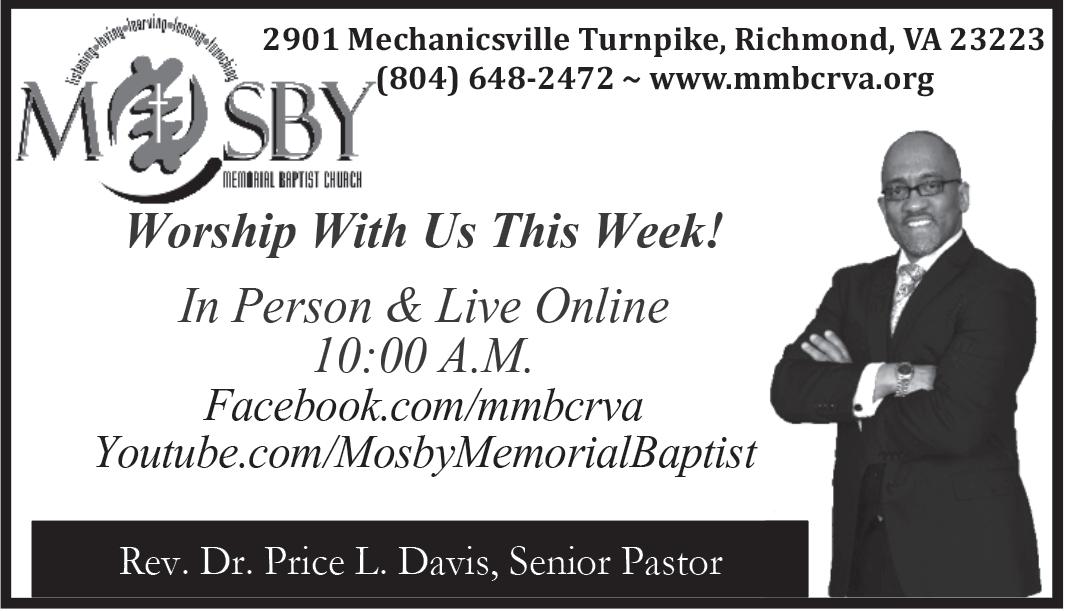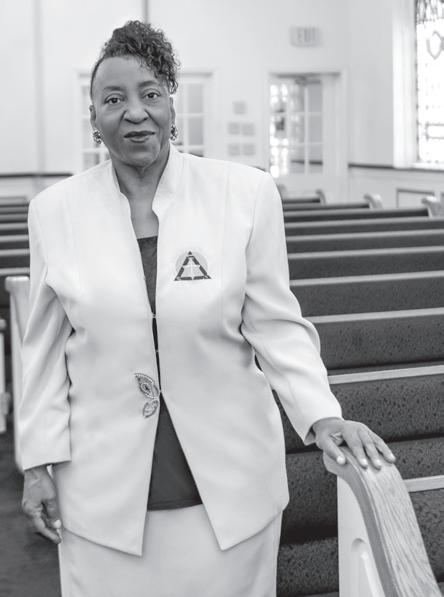
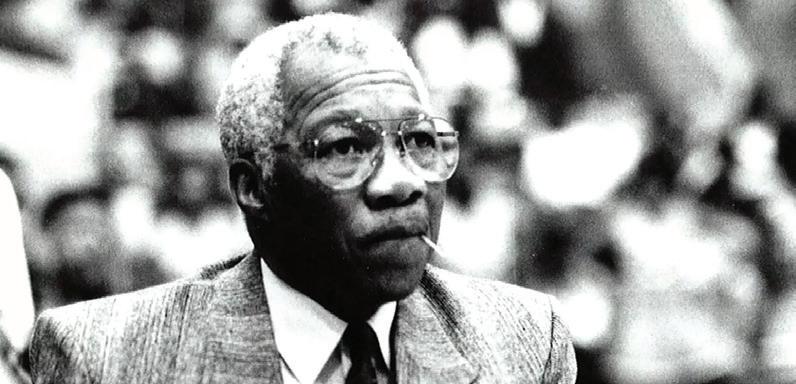



By George Copeland Jr.
Richmond Public Schools’ historic collective bargaining agreement will remain unchanged for now after the Richmond School Board voted 6-3 Tuesday to defer a decision on proposed changes.
The board will consider proposed changes to the resolution next month and will hold discussions with RPS union representatives in the coming weeks on any adjustments.
“I think that we can go back and look again,” said board Chair Shavonda Fernandez, who requested the deferral and joined board members Katie Ricard, Emmett Jafari, Matthew Percival, Stephanie Rizzi and Shonda Harris-Muhammed in approving it.
The proposed resolution, introduced by RPS Superintendent Jason Kamras’ administration, has been presented as ways to improve the bargaining process in response to staff feedback and a limited budget. The changes would include barring organizing activities during times that disrupt RPS operations, limits on negotiation topics for both parties, and approving agreements only when RPS has enough funding.
The board’s decision came after days of pushback from Richmond education unions and their allies, including a large rally outside City Hall before the board’s work session Monday.
“Last night was a victory for the diligent workers of Richmond Public Schools,” Teamsters Local 322 President Brian Peyton said in a statement Wednesday. “Now, we must move forward together to ensure any changes to the collective bargaining policy serve all students, parents and workers.”
Del. Michael Jones and Richmond City Council member Kenya Gibson spoke in support of the unions during Monday’s rally, while 25 people at Tuesday’s meeting urged the board to reject the resolution.
Union members and supporters criticized the changes for potentially limiting employee free speech and bargaining, creat-
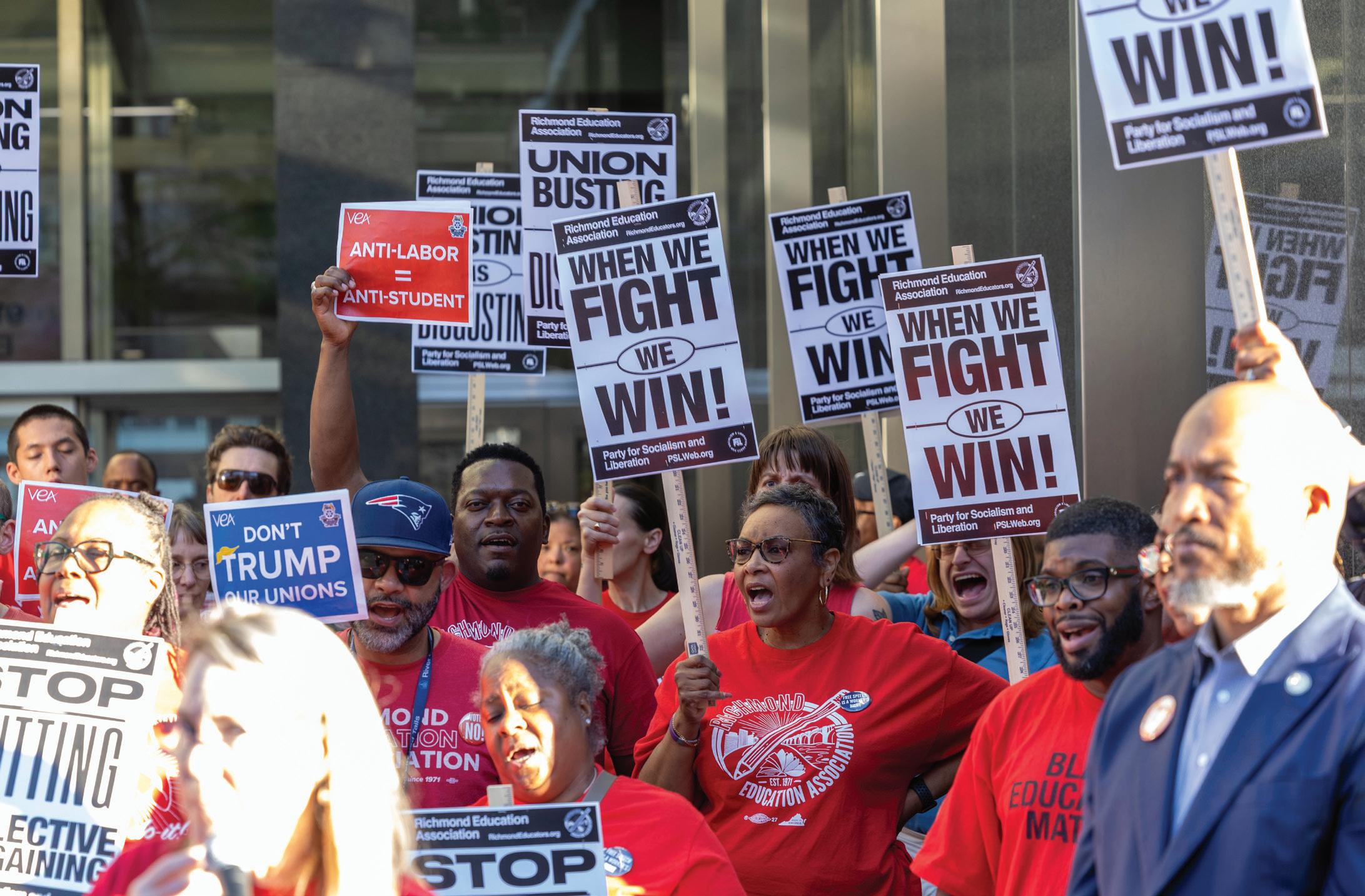
for Richmond Public
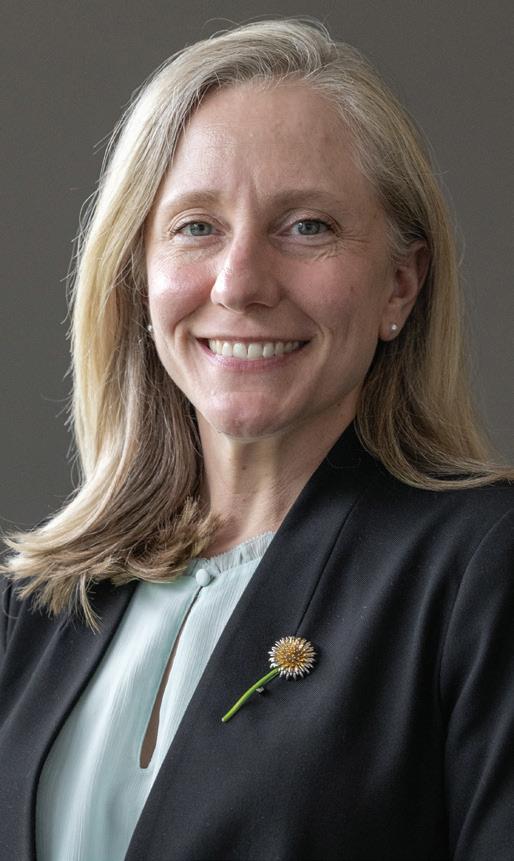
Free Press staff report
Norfolk State University will host the only face-to-face debate between the Republican and Democratic candidates for Virginia governor on Oct. 9.
Lt. Gov. Winsome Earle-Sears and former Congresswoman Abigail Spanberger will meet at 7 p.m. at the L. Douglas Wilder Performing Arts Center on the university’s campus. The event will be broadcast live across Virginia on Nexstar Media Group stations, potentially reaching more than 4 million viewers.
The debate will be moderated by WAVY-TV 10 news anchor Tom Schaad and WRIC-TV anchor Deanna Allbrittin. In addition to WAVYTV 10 in Portsmouth, the telecast will air on WRIC-TV in Richmond.
“This is the third statewide debate we have hosted since 2020, and I am glad the university
By Dean Mirshahi and Sean McGoey VPM News
Tavares Floyd, whose 2024 campaign for Richmond City Council drew scrutiny after the accuracy of his campaign finance filings was questioned, was indicted Monday on four counts of felony election fraud.
Online court records show that a grand jury in Richmond City Circuit Court found prosecutors had enough probable cause to charge Floyd with four counts of knowingly making false statements on campaign documents.
If convicted on the four Class 5 felony charges, Floyd could get up to 40 years in prison.
“Each indictment charges Tavares Floyd with willfully making materially false statements on certain of his campaign finance reports,” Richmond Commonwealth’s Attorney Colette McEachin said Monday afternoon outside the John Marshall Courts Building.
“These charges are the result of a diligent investigation by the Virginia State Police,” McEachin said, adding that the 10-month investigation involved dozens of interviews and forensic accounting.
McEachin began her remarks by noting the public attention the case has received, saying the indictments followed “months of speculation by the press and by Richmond citizens.” She
Please turn to A4
can serve as a forum where voters can learn more about the candidates,” said Norfolk State President Javaune Adams-Gaston.
Carol Ward, vice president and general manager of WAVY-TV 10, added that the station is committed to providing impartial coverage to help voters make informed decisions.
The debate represents the only opportunity for Virginians to see the candidates face-to-face before the election.
Meanwhile, the University of Richmond, in partnership with the Virginia State Bar Young Lawyers Section, will host the 2025 Virginia Attorney General debate on Thursday, Oct. 16.
Candidates Jason Miyares and Jay Jones will present their platforms, address key issues and answer questions central to Virginia voters.
Virginia State Bar President K. Brett Marston

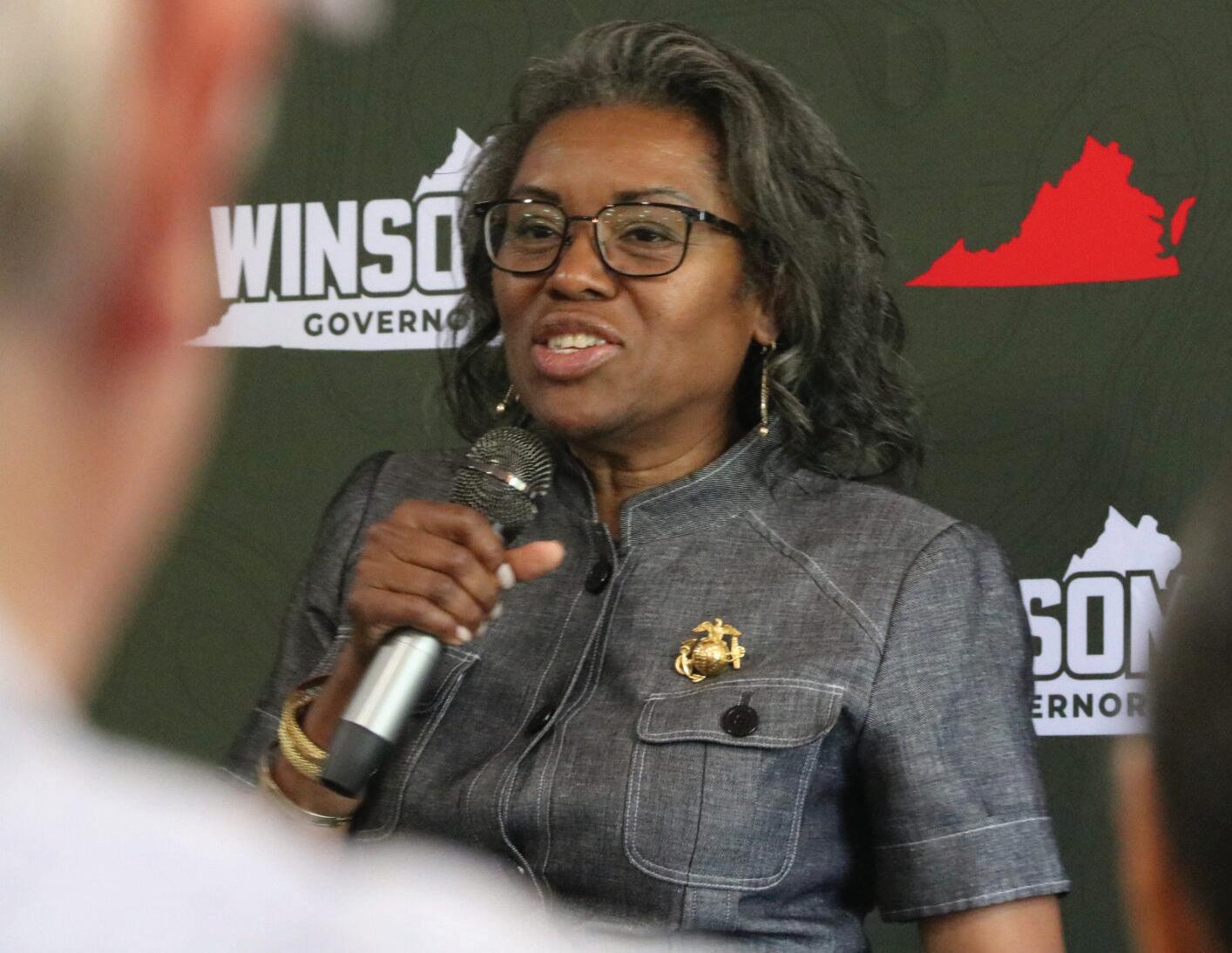
By Markus Schmidt
Virginia Republican gubernatorial nominee Winsome EarleSears built her political brand on transparency and accountability.
But a closer look at her public filings reveals a pattern of omissions and inconsistencies in her financial disclosures — including a $12,000 “gift” far above the state’s legal limit and multiple undisclosed trips funded by outside organizations.
The Mercury reviewed several Statements of Economic Interests (SOEI), campaign finance reports and related documents obtained through the Virginia Conflict of Interest and Ethics Advisory Council.
The records show that Earle-Sears, who has served as lieutenant governor since 2022, repeatedly failed to disclose gifts and travel benefits as required under state law and, in several instances, amended her filings only after watchdogs or reporters raised questions.
“These aren’t minor oversights,” said Alex Keena, an associate professor of political science at Virginia Commonwealth University who studies political ethics and campaign finance.
“To me, this raises serious concerns about her ability to govern lawfully and ethically and highlights obvious conflicts of interest.”
The Mercury sent Earle-Sears’ campaign a detailed list of questions regarding her financial disclosures, including specific inquiries about her reporting of gifts, travel and amendments. The campaign did not respond to several emails before publication.
$12,000 ‘gift’ defied state’s limits
One of the most striking irregularities in Earle-Sears’ filings dates to June 2021, when she reported receiving a $12,000 “gift” from Black Americans to Reelect
Free Press staff report
Mayor Danny Avula announced Wednesday the addition of four new members to the city’s Zoning Advisory Council, expanding the panel from 17 to 21 members in response to resident calls for broader representation in planning decisions.
The Planning Commission unanimously approved the expansion Tuesday to address gaps in geographic representation and strengthen community input on Richmond’s housing crisis. Council districts 4 and 7 currently have no representation on the advisory council, while districts 2, 8 and 9 each have only one member.
“People want to know that their voices matter,” Avula said. “The feedback from residents was really important, so the team and I set about adding new representation.”
The Zoning Advisory Council is a nondecision-making subcommittee of the city Planning Commission composed of Richmond residents who help guide updates to the city’s zoning ordinance.
The Planning Commission consists of nine appointed members responsible for adopting the city’s master plan and other duties. A list of council members and a meeting schedule are available on the city’s website.
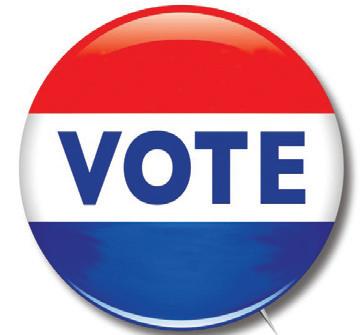
Richmond voters are now casting ballots early for the 2025 elections, including races for governor, lieutenant governor, attorney general and members of the House of Delegates. Early voting allows residents to vote in person before Election Day and can help reduce wait times at polling places.
In Richmond, early voting locations include the Office of Elections at 2134 W. Laburnum Ave., City Hall at 900 E. Broad St. and the Hickory Hill Community Center at 3000 E. Belt Blvd. Henrico County voters can visit the Western Government Center at 4305 E. Parham Road, the Eastern Government Center at 3820 Nine Mile Road or the Varina Library at 1875 New Market Road. Chesterfield County residents may use the Central Library at 7051 Lucy Corr Blvd.
Early voting runs through Friday, Nov. 1. Hours are generally Monday through Friday from 8:30 a.m. to 5 p.m., with select Saturdays also open from 9 a.m. to 5 p.m.
The deadline to register to vote in Virginia is Friday, Oct. 24. Residents can register online, by mail or in person at their local registrar’s office. Voters who prefer to vote by mail can request absentee ballots through the Virginia Department of Elections website or by contacting their local registrar. Requests must be submitted by the posted deadlines to ensure ballots are received and returned in time. Election officials encourage Virginians to take advantage of early voting to avoid long lines and ensure their participation in the democratic process. For the latest information on locations, hours, registration and deadlines, visit elections.virginia.gov.
Free Press staff report
Supporters of efforts to reclaim and memorialize Richmond’s Shockoe Bottom district will gather Friday, Oct. 10, for the 23rd annual Gabriel Gathering. The event, set for 6:30 to 8 p.m. at the Shockoe Bottom African Burial Ground, will mark the 225th anniversary of the execution of Gabriel, the enslaved blacksmith who led a planned rebellion against slavery in 1800.
Gabriel was executed on Oct. 10, 1800, near the area that later became the center of the U.S. domestic slave trade. For decades before the Civil War, Shockoe Bottom served as a major hub where more than 300,000 enslaved men, women and children were sold out of Virginia.
The gathering comes as the city’s Shockoe Project — a 10acre memorial park now in development — continues to take shape. The project, the result of more than 30 years of community advocacy, aims to honor those who were enslaved and to recognize the wealth their forced labor helped create.
Scheduled speakers include Pamela Bingham, a descendant of Gabriel and a member of the Binghams of African Descent National Family Association; Ana Edwards, chair of the Sacred Ground Historical Reclamation Project of the Virginia Defenders for Freedom, Justice and Equality; and Phil Wilayto, editor of The Virginia Defender newspaper.
The program will also highlight a new city-sponsored banner at the site illustrating the historical importance of the Shockoe Project. The event is free to the public, and attendees are encouraged to bring a flower to honor the ancestors.
More information is available on the Facebook page “23rd Annual Gabriel Gathering.”

By George Copeland Jr.
“No contract, no coffee!”
This chant and others echoed at West Cary and Thompson streets Saturday afternoon as Starbucks workers from multiple local locations rallied with the community for a practice picket in response to recent store closings and layoffs. The picket was a nonstrike demonstration meant to show solidarity and signal readiness for labor action.
About 30 people attended the rally, which featured testimonials from Starbucks workers and a march in front of the Starbucks on West Cary Street, one of multiple Richmond-area stores to have unionized since 2022.
Five Richmond-area stores were the first in Virginia to unionize, and local workers have continued participating in nationwide bargaining efforts since then.
Workers, their supporters and the Starbucks Workers United (SWU) labor group hope that the picketing and warnings of potential strikes will spur corporate leaders to resume good-faith negotiations.
“We’re telling the company we’re willing to go on strike like we have before in order to move things along,” said Al Gilstrap, who works at the West Cary Street store.
The practice picket was one of 35 organized and held in cities across the country, according to SWU, after Starbucks Chairman and CEO Brian Niccol announced hundreds of store closures and 900 nonretail worker layoffs. Union stores account for 10% of those impacted, according to Gilstrap.
Starbucks stores on Arthur Ashe Boulevard and Commerce Road as well as locations across Virginia have closed as part of these changes as Starbucks attempts to improve store performance, according to the company.
“These steps are to reinforce what we see is working and prioritize our resources against them,” Niccol said in a Sept. 25 letter to employees announcing the closures and layoffs. “I know these decisions impact
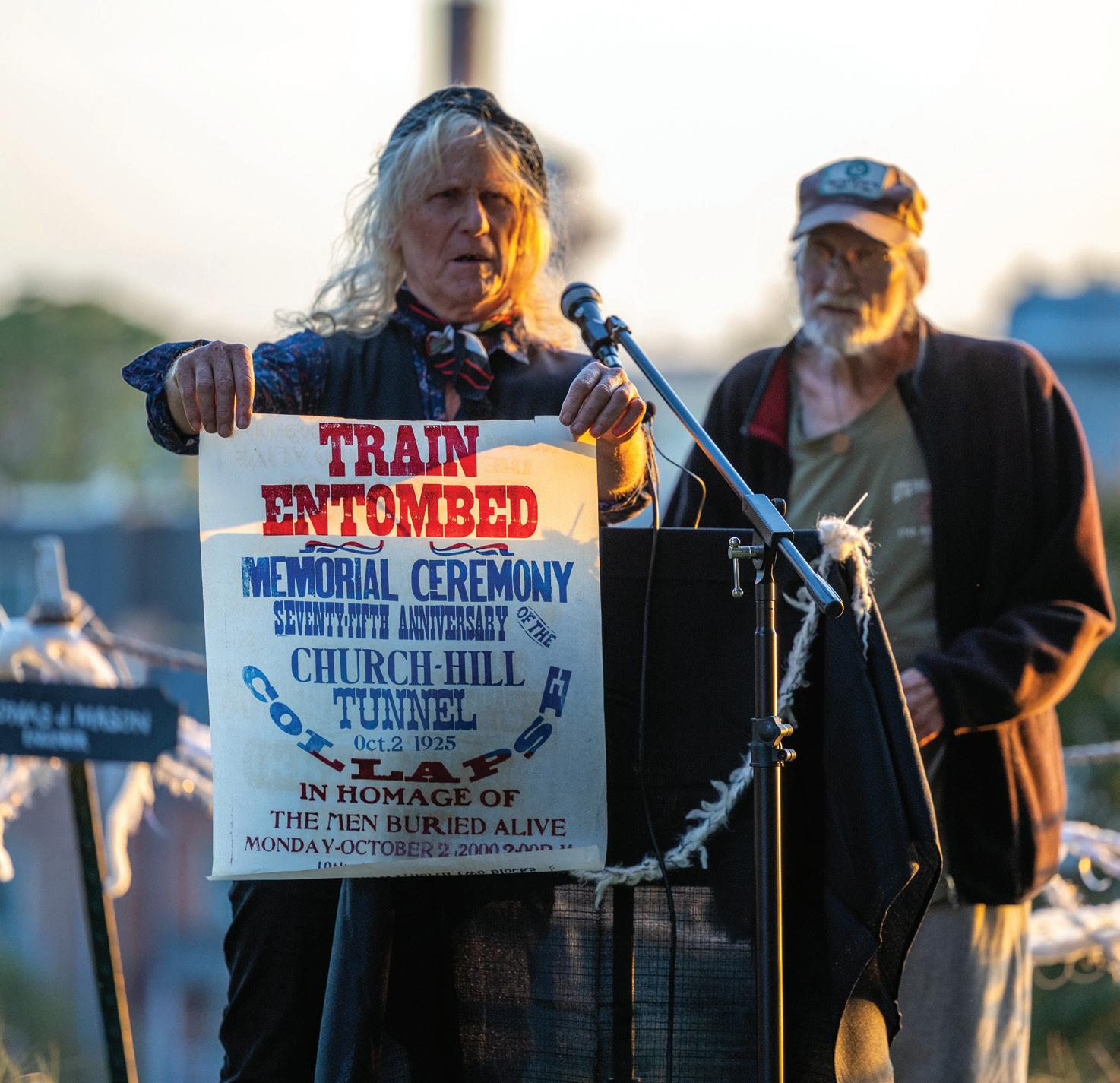

our partners and their families, and we did not make them lightly.”
While SWU has managed to secure some benefits and protections for affected union baristas, not all affected workers are unionized and able to be supported.
The closures and layoffs, which mark the latest labor conflict Starbucks has seen since Niccol assumed leadership of the company, follow a suit filed in three states over the new store dress code.
“We are really close to finishing a contract and since (Niccol’s) involvement, it’s really slowed down,” Gilstrap said.
Starbucks workers and their supporters believe the outcome of the negotiations is important not only for the stores but also for other industries, showing a way forward for labor rights if successful.
“Unions aren’t just about your job,” said Strawberry Street store barista and organizer Judith Vought. “It’s about creating a community or an environment where, if something happens … you’re going to have a support system to help you through those hard times.” If negotiations stall or fail, workers said they are concerned other companies could also resist unionization, especially as labor protections weaken nationwide.
Given the stakes, Starbucks workers and their supporters were clear about the need for solidarity and empathy in and outside of work as labor efforts continue.
“It’s up to us as a union and a community to take care of each other,” Vought said.

By Graham Moomaw
Two months after former Virginia Gov. Doug Wilder sued a pair of VCU leaders over a recent workplace investigation involving him, Wilder is voluntarily dropping the case.
Wilder filed a motion to dismiss the case on Tuesday, and a federal judge ordered the case closed the same day.

The former governor and Richmond mayor had sued VCU President Michael Rao and Chief Audit and Compliance Executive Suzanne Milton over a probe earlier this year into the workplace culture of the L. Douglas Wilder School of Government and Public Affairs.
Wilder, who holds the title of distinguished professor at the school named in his honor, claimed the investigation violated his rights and was an act of retaliation against him for his past criticism of VCU leadership. Attorneys for VCU said the probe was a routine step taken in response to multiple complaints.
The VCU lawyers were seeking to have the case dismissed by the court, arguing it was too vague and light on factual claims to proceed.
The lawsuit was dismissed “without prejudice,” meaning Wilder could still refile it in some other form. The court filings do not give a reason for why the suit is being dropped.
The move leaves the latest Wilder-VCU drama in a sort of limbo, with no clear resolution.
Wilder and an attorney working with him on the suit didn’t respond to an email requesting comment for this story. A VCU spokesperson declined to comment.
Earlier this year, former Wilder School employee Bill Leighty accused Wilder of being behind his sudden, midsemester ouster from the school, leaving government students without their regular professor.
Leighty, who previously served as chief of staff to former Govs. Tim Kaine and Mark Warner, said at the time that he felt Wilder had been given too much power over the school’s affairs and is allowed to use the school as “his perch to throw slings and arrows at people who he thinks don’t agree with him.”
VCU has not disclosed specifics about the complaints that Wilder claims led to unfair scrutiny of him, apart from saying the allegations deal generally

with bullying or toxic/abusive behavior. An outside law firm hired to conduct the Wilder School investigation issued a 31-page report on June 30, but the university isn’t releasing the full document. Through a Freedom of Information Act request, The
Richmonder obtained a heavily redacted copy of the report, which was prepared by the Husch Blackwell law firm.
Specific details on what the law firm found are redacted, but a summary indicates few other Wilder School employees agreed with the idea there were
problems in the workplace.
“In summary, aside from the Reporter, no other employees interviewed described the work environment as toxic or threatening,” the report said, referring to the person who filed one of the complaints.
“To the contrary, with the ex-
ception of the Reporter, none of the witnesses interviewed identified any instances in the WSGPA workplace that made them uncomfortable or that they considered intimidating, offensive, or abusive. There is no evidence of physical violence or abuse.”
The final line of the summary, which mentions a review of emails, is redacted. According to the report, the law firm reviewed more than 4,700 emails sent between Jan. 1 of 2024 and June 10 of this year. This article originally appeared in TheRichmonder.org

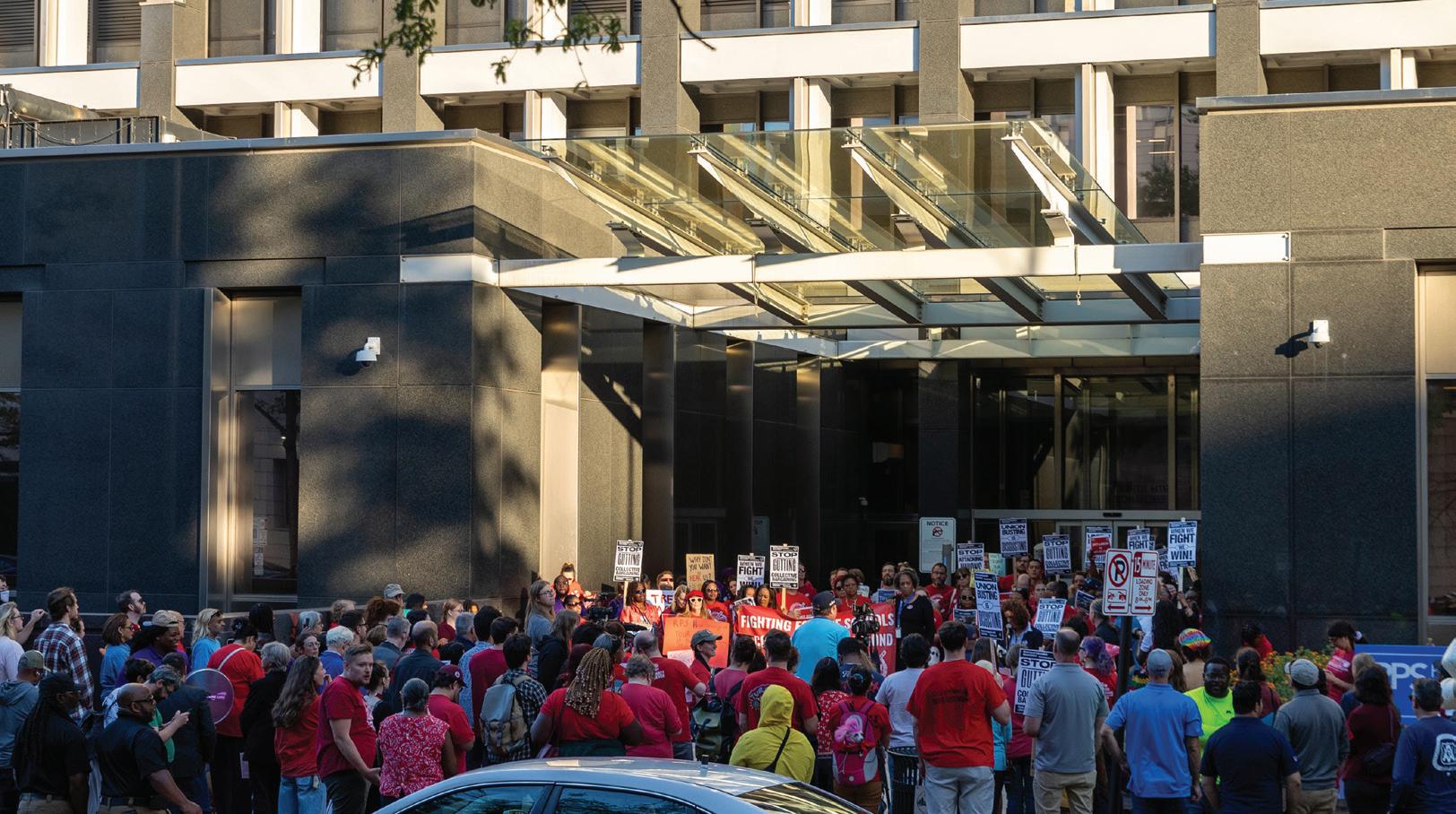
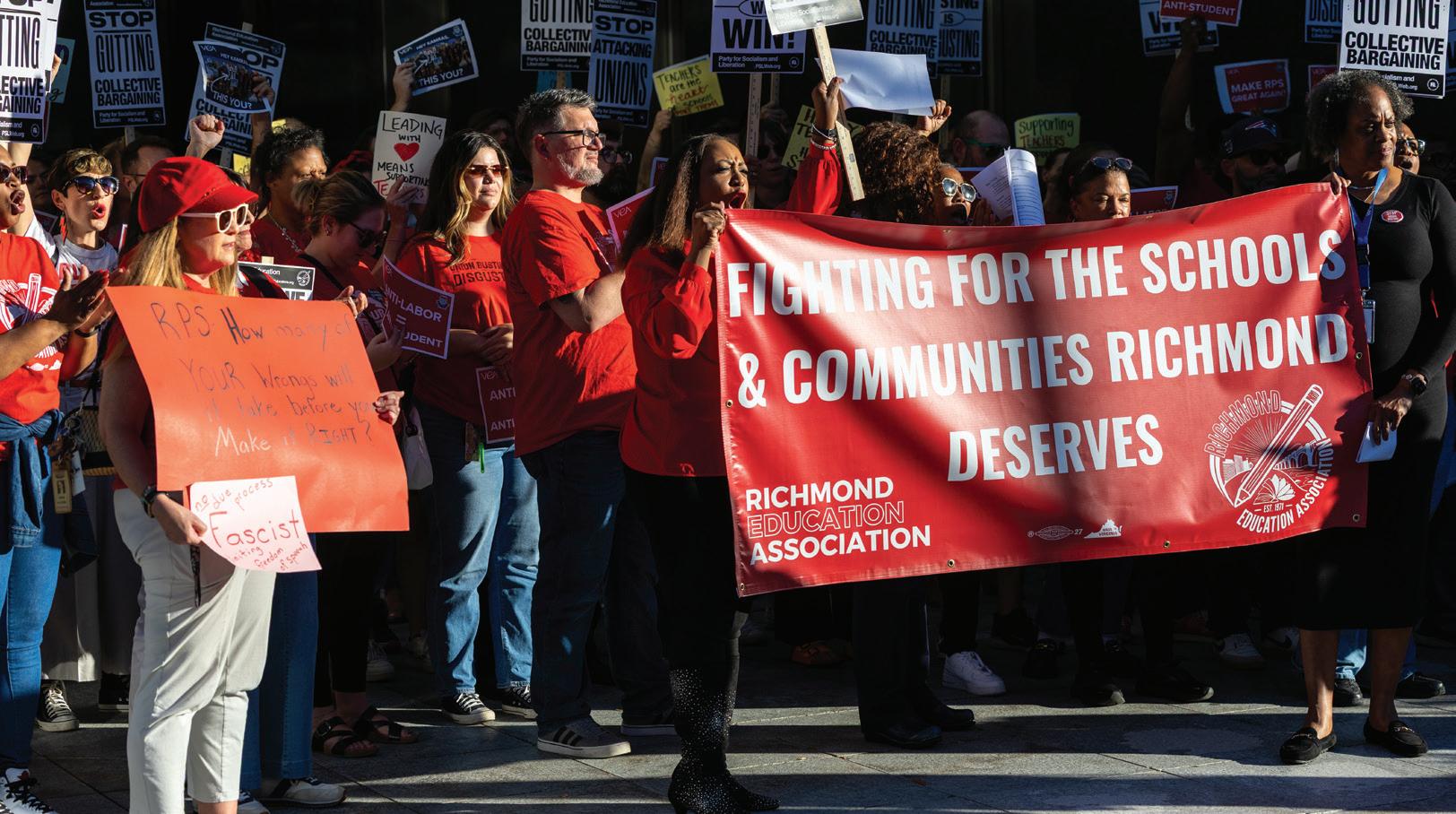

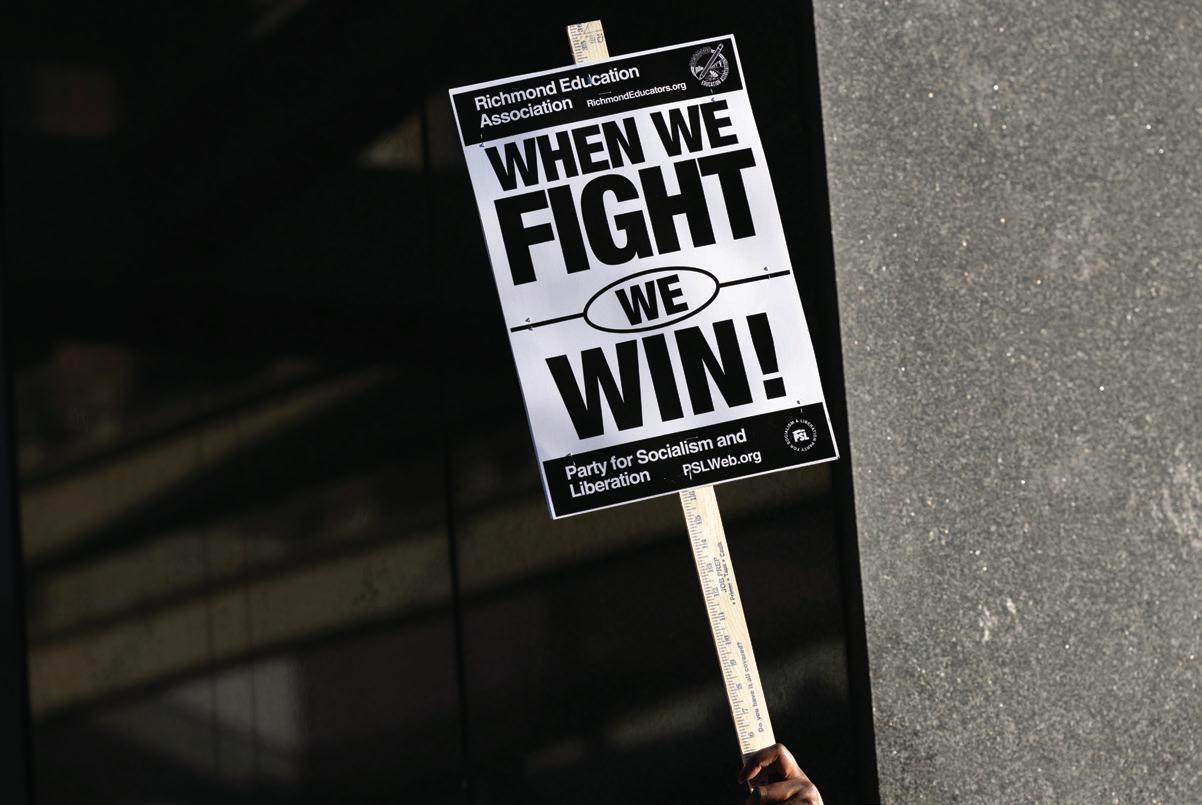
Continued from A1
ing pay cut mechanisms, and eliminating due process. They also questioned the short time between the proposal’s introduction and Tuesday’s planned vote, saying they had little opportunity to review the changes or suggest revisions.
“We need an opportunity to come together, truly together and make changes to the resolution that yield to the true definition of compromise,” said Richmond Education Association President Andrea Bryant.
Some board members, while in favor of a more efficient process and parts of the proposal, also questioned the short timeline during their discussion of the resolution Tuesday. Similar questions continued to be raised by members after the deferral was requested.
Board members also expressed concern over the impact of the
Continued from A1
will moderate the debate.
The event is scheduled for 6 to 7:30 p.m. at the Modlin Center for the Arts’ Camp Concert Hall, 453 Westhampton Way, Richmond. While all tickets have been claimed, a livestream will be available online at law.richmond.edu/vaagdebate2025.
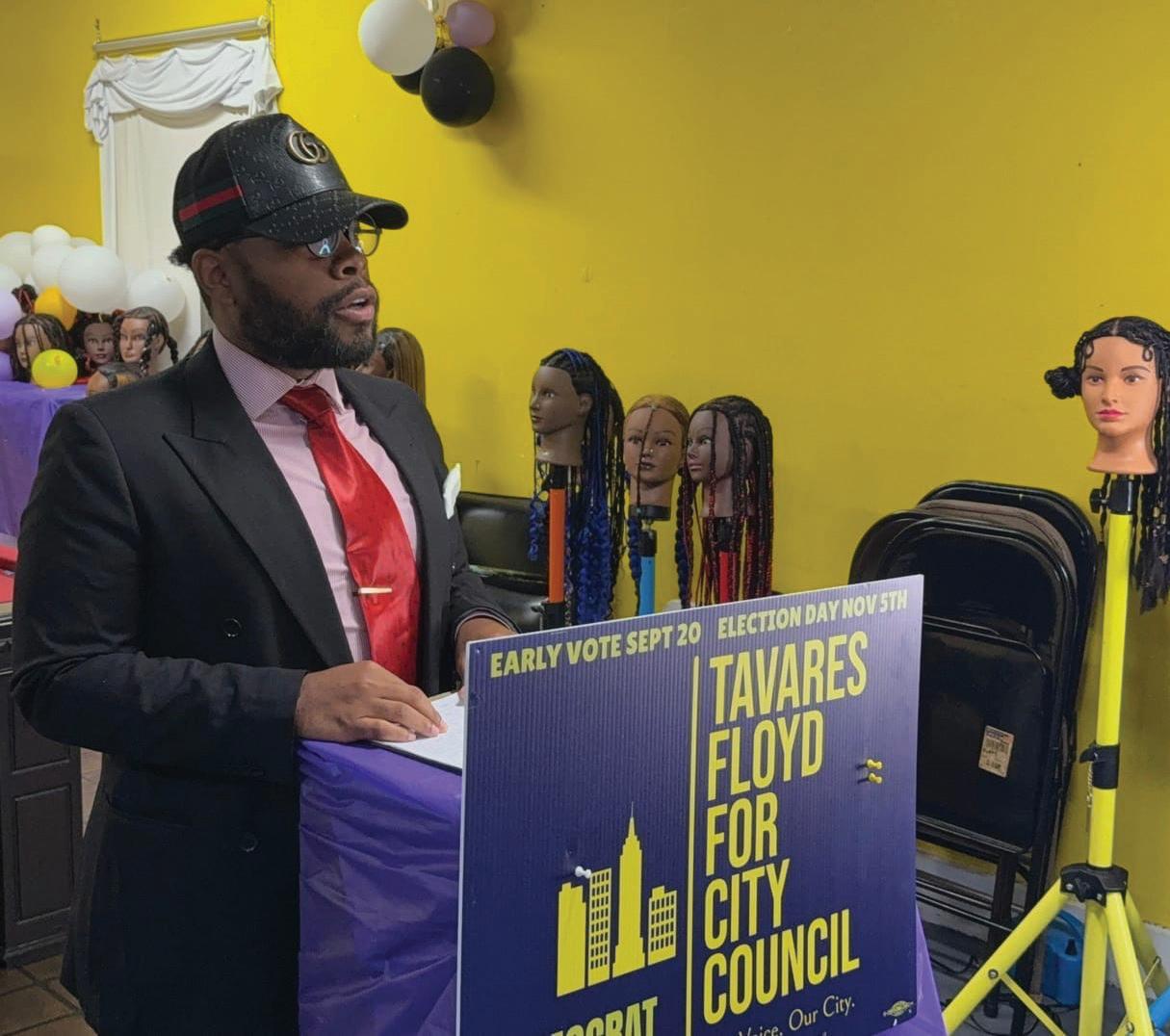
Continued from A1
did not take any questions from reporters, stressing that it is an active criminal prosecution and that her office does not “try cases in the media.” Floyd, who was once longtime 6th District Councilor Ellen Robertson’s liaison, ran against his former boss in the 2024 election. His campaign came under scrutiny after several listed donors to Floyd’s campaign said they had not, in fact, donated.
As previously reported, Floyd claimed to be a lawyer despite not being licensed to practice law in any U.S. state or territory or the District of Columbia.
He also claimed in a required financial disclosure form to be an owner of a funeral home based in Charlottesville. The owner of that funeral home, Robert “R.B.” McClenny Jr., told VPM News that Floyd “has never owned any part of the business.” Floyd ultimately finished third, behind Robertson and local barber and community organizer Willie Hilliard, with just under 15% of the vote.
discussion so far, from the rhetoric used by some critics of the changes to the relationship between RPS leaders and employees moving forward.
“I worry that this process has eroded trust between our management and our staff,” said 3rd District board member Ali Faruk. “If you want more efficiency and effectiveness, you really do have to build trust, because I think in the long run the eroded
trust will cost us more.”
and
The board is set to reconvene for a work session Monday,
a
Continued from A1
Trump organization for which she served as national chair. The disclosure appears in her 2021 SOEI filing, but she did not check any box to claim an exemption from Virginia’s $100 gift cap.
According to state law, public officials may accept gifts exceeding $100 only if they fall into narrow categories, such as attendance at a “widely attended event,” a gift from a personal friend, or a token of appreciation from a foreign dignitary. The law explicitly defines these exceptions under the code.
The $12,000 payment to Earle-Sears does not appear to meet any of those criteria, and no exemption was indicated on her form filed with the Virginia Conflict of Interest and Ethics Advisory Council.
At the same time, federal election filings show that the same group paid Earle-Sears $7,966.12 for “event organizing,” “copy editing” and travel between April and December 2019. The payments, disclosed to the Federal Election Commission, included airfare, lodging, meals and consulting services.
The dual reporting — as both a “gift” and as payments for work — blurs the line between compensation and gratuity. If the $12,000 was payment for her services, it should have been declared as income. If it was indeed a gift, it far exceeded the state’s allowable threshold.
The 2021 disclosure, though publicly available, had not been widely reported until now.
Undisclosed ALEC travel
Between 2021 and 2023, Earle-Sears attended and spoke at multiple events hosted by the American Legislative Exchange Council (ALEC), a conservative nonprofit organization known for promoting model legislation on behalf of corporate members and Republican state lawmakers.
In December 2021, one month after being elected lieutenant governor, she was a keynote speaker at ALEC’s States and Nation Policy Summit in Washington, D.C., alongside then-South Dakota Gov. Kristi Noem.
In November 2022, she delivered another keynote at ALEC’s annual summit, which also featured former Vice President Mike Pence, according to an ALEC news release.
And in October 2023, she appeared as a featured guest at ALEC’s 50th Anniversary Gala in Washington, where she was billed alongside Republican Sen. Pete Ricketts of Nebraska and conservative commentator Hugh Hewitt.
Despite these high-profile appearances, none of the events — nor any related travel or lodging — appear on her state financial disclosures.
Her 2022, 2023 and 2024 SOEIs each include a section requiring the filer to list “any lodging, transportation, money, or other thing of value” exceeding $100 received in their official capacity. Each year, Earle-Sears either checked “No” or
reported nothing in that section.
That omission matters, because ALEC routinely covers travel and lodging expenses for elected officials. The group’s funding structure has long drawn criticism for creating an opaque pipeline between corporate donors and state legislators.
“Earle-Sears’ participation in multiple ALEC conferences without reporting any travel support is significant,” Keena said.
“These are not inexpensive junkets. It reinforces the perception that there are special interests underwriting her access and agenda — and the public doesn’t see who’s paying.”
The Mercury found no record of EarleSears seeking reimbursement for any of the ALEC-related travel from her office, nor any campaign expenditure filings corresponding to those events.
Pattern of late or missing disclosures
The $12,000 gift and the unreported ALEC travel fit a larger pattern of incomplete or revised disclosures during Earle-Sears’ time as lieutenant governor.
In February 2025, Earle-Sears filed her annual Statement of Economic Interests and certified that she had received no gifts or travel exceeding $100 in the previous year.
But three months later, following a FOIA request by Democratic activist Josh Stanfield that revealed her participation in a 2024 trip to Israel funded by the Combat Antisemitism Movement, Earle-Sears filed an amended report.
In the revised May 22 filing, she acknowledged seven previously undisclosed trips paid for by outside organizations, totaling $15,784.66, including the $6,000 Israel trip.
Two other Virginia officials on the same delegation — Sen. Bryce Reeves, R-Spotsylvania, and Del. A.C. Cordoza, RHampton — each valued the trip at $10,000, Virginia Scope reported in late July.
Earle-Sears’ office did not explain the discrepancy or why the trips had not been reported in her initial February filing.
Private flights and unanswered questions
Earle-Sears’ disclosure history has drawn additional scrutiny since the Richmond Times-Dispatch reported this summer that her April 2023 travel between Winchester and Abingdon matched the flight path of a private plane owned by Gary Duncan, a car dealer and campaign donor whose business is regulated by the state.
Flight data reviewed by the newspaper showed Duncan’s Pilatus PC-12 aircraft made stops in Winchester and Abingdon that same day, aligning with Earle-Sears’ appearances in both cities. Her campaign finance reports and ethics filings contain no record of that flight or any payment for private air travel.
Asked about the flight more than two years later, Earle-Sears’ communications director told the newspaper, “We’re still trying to figure it out.”
Under Virginia law, a public official who knowingly files a false or incomplete Statement of Economic Interests is guilty of a Class 5 felony. The statute requires
filers to sign an affirmation certifying their report is “full, true, and correct to the best of [their] knowledge.”
So far, neither Earle-Sears nor her campaign has addressed whether she reimbursed the donor, received the flight as a gift, or plans to amend her filings. An ethics system built on self-policing Virginia’s conflict-of-interest laws rely heavily on self-reporting and public disclosure, with limited enforcement power. The state’s Conflict of Interest and Ethics Advisory Council can provide guidance and review forms but lacks the authority to investigate or penalize violations. Enforcement typically falls to local prosecutors or the attorney general, who seldom pursue such cases unless prompted by outside complaints.
“Sadly, hers is not a unique case,” Keena said. “President Donald Trump has exposed fundamental weaknesses in the enforcement of campaign finance law at the federal level, as the FEC has repeatedly chosen not to enforce obvious violations of federal law. At the state level, given Virginia’s lax treatment of campaign money, there seem to be little to no consequences for skirting the rules for a powerful elected official like Earle-Sears.”
Indeed, past scandals involving Virginia officials — from former Gov. Bob McDonnell’s conviction on corruption charges that were later overturned to lesser-known disclosure lapses by members of both parties — have led to only incremental reforms. While the General Assembly tightened some reporting thresholds after 2014 and passed legislation this year that bars candidates from using campaign contributions for personal benefit, it stopped short of imposing strict oversight or independent audits.
A broader pattern of opacity
Earle-Sears’ ethics issues extend beyond the headline-grabbing flights and trips.
Between 2011 and 2021, she owned Shenandoah Appliance, Plumbing and Electric, a Winchester-based business she purchased from its founder, Dave Brown. Earle-Sears disclosed the business on her 2012, 2013 and 2014 financial statements but failed to list it as a principal business activity in 2015, even though she continued to own it. She later told reporters during her 2021 lieutenant governor campaign that she had shut down the company because she “couldn’t hire workers,” according to the Richmond Times-Dispatch. That inconsistency — coupled with her unexplained $12,000 payment, undisclosed ALEC trips and amended filings — suggests a recurring pattern of incomplete or misleading financial transparency. So far, no state agency has announced any review of Earle-Sears’ filings. If complaints are filed, they could trigger an investigation by the attorney general’s office or the State Board of Elections, though both have historically deferred to self-correction.
This story originally appeared on VirginiaMercury.com.
Free Press staff report
Virginia State University has opened the Alfred W. Harris Academic Commons, the largest facility in the school’s 143-year history. The 175,000-square-foot building houses the College of Humanities and Social Sciences and the College of Education and is designed to support academic programs, student engagement and community activities.
“The completion of the Alfred W. Harris Academic Commons is a defining moment for Virginia State University,” said Kevin Davenport, senior vice president for finance and administration. “From the beginning, this project was more than bricks and mortar—it was a bold investment in our students, faculty, and future.”
The facility includes classrooms and offices as well as amenities such as a swimming pool, gymnasium, six basketball courts, an elevated indoor running track, a black box theater, dance studios, an art gallery and broadcast and recording studios.
Construction began in 2022 and was led by Skanska USA. Classes are scheduled to start in January.
“This project is an investment for the next generation of scholars,” said Mark Balling, executive vice president responsible for Skanska’s Mid-Atlantic building operations.
The building, named for the university’s founder, Alfred W. Harris, represents a significant expansion for VSU and a central hub for collaboration, creativity and student activity.

By Nathaniel Cline
Most school board members in Virginia and across the country have a higher level of optimism about their school districts than the public, reflecting a key public education disconnect, according to a study published by the Fordham Institute on Wednesday.
The research, supported by the conservative think tank, comes as school boards and the communities they serve increasingly diverge over policy decisions and values. In Virginia, conservatives have also pushed for voucher programs and charter schools, which opponents say will divert funding from public schools.
About 75% of the 5,364 school board members across 3,093 districts surveyed for the study said they would give their schools an “A” or “B.” The study adds that among the general public, however, only about half grade their own schools so highly.
“If board members consistently overestimate the quality of their districts, they may fail to recognize the urgency of reform in those same districts,” the report states. “They may dismiss parental complaints as outliers rather than indicators of systemic problems. And they may approve policies or budgets that assume satisfaction when dissatisfaction is widespread.”
The study, co-authored by David

Houston and Michael Hartley, called Who’s on Board? School Boards and Political Representation in an Age of Conflict,”includes school board member findings about demographic gaps, and their perceptions of elections and political alignment with the rest of the country. The study also pulled from previously conducted public surveys — including from Gallup, U.S. Census and Education Next Survey of Public Opinion — to generate estimates of the general population.
According to the study, school board members showed higher rates
of alignment with the average of the U.S. population on cultural war issues like transgender student access than on long-standing debates like charter schools and teachers’ unions.
In Virginia, transgender student access has been a hot button issue over the past four years. Gov. Glenn Youngkin’s administration overhauled the state’s transgender student policies, which now states “students shall use bathrooms that correspond to his or her sex, except to the extent that federal law otherwise requires.”
The total number of local school
boards that have adopted the policies is unclear, however a few in Northern Virginia have opposed making any changes, in an effort to support transgender students. The U.S. Department of Education is now targeting some of them for their bathroom policies.
Transgender students’ bathroom access has also become a flashpoint in the gubernatorial race, with Republican candidate Winsome Earle-Sears speaking out against Loudoun County’s policy that allows students to use restrooms aligned with their gender identity rather than their sex assigned at birth. Democratic candidate Abigail Spanberger has broadly promised to protect LGBTQ+ students’ rights if she is elected governor.
Regarding charter schools, researchers found that 59% of school board members oppose them, compared to 45% of the public respondents who favor them.
In Virginia, the governor’s efforts to increase the number of charter schools have struggled due to pushback from some lawmakers and the state constitution’srequirement of state and local approvals. Virginia has a total of seven charter schools.
Nationwide, board members’ general political identity closely matches the country’s political leanings and policy views, according to the study. The report further states that about
65% of all board members share the same political party affiliation as the majority of voters in their local district.
In Virginia, school board candidates are elected without political party affiliation; however, some have received endorsements from political parties and organizations that favor specific political values.
The study also identified demographic trends on school boards, including that most board members are more likely to be white and highly educated, and a quarter of members are current or former public school teachers. Researchers also said they found “gender parity” on American school boards after a 2001 survey by Hess and Leal reported that six in 10 board members were male.
Board members nationwide described different electoral environments, which vary based on the size of the district, according to the study. The report goes on to say that in smaller districts, most elections are neither very competitive nor very partisan, and teachers’ unions play a relatively minor role.
In larger districts, serving over 5,000 students, school board elections are more competitive, highly partisan and influenced significantly by major interest groups. This story originally appeared at VirginiaMercury.com.
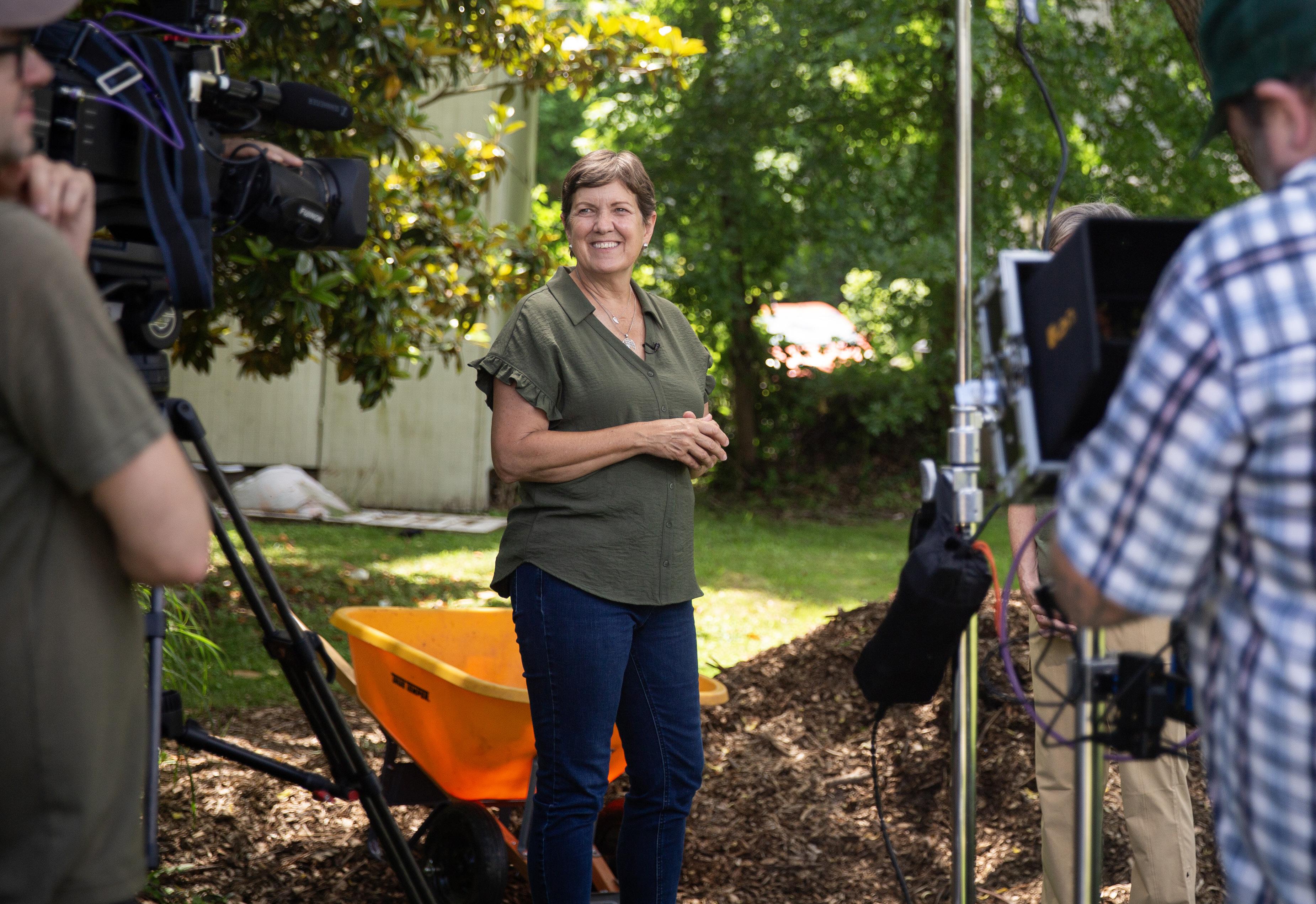
By Sarah Vogelsong
On Aug. 27, 2002, the body of a man was found in a ravine next to a brickyard in Blackwell.
Twenty-three years later, officials still do not know who he was or how he ended up there, to one side of Riverside Brick & Supply Co. at 12th and Maury streets in South Richmond, badly decomposed and with no identifying markers beyond a pair of blue slip-on size 10 shoes.
DNA testing done in 2012 revealed that the man was Black and somewhere between 45 and 60 years old. But it turned up no matches that could lead to a name.
“He’s been unidentified for 23 years,” said Lara Newell, the long-term unidentified coordinator for Virginia’s Office of the Chief Medical Examiner. “That’s a whole adult, you know. That’s an adult that can vote and can drink and they can drive, and they probably have a job. If they had a child, that child is all grown up now and may have their own family.”
Newell is hoping that by bringing the case back into the public eye, someone might be able to come forward with information that could lead to the man’s identification.
“Maybe they have a family member that they didn’t think was a missing person back then, but now they haven’t heard from them in a while,” she said. Or, she added, “maybe someone is now willing to provide information to the medical examiner or law enforcement, or they’ve come to the realization that their loved one might be dead, and now they’re willing to

investigate the possibility that they are one of our identified decedents.”
The man from the brickyard is one of about 335 Virginians whose remains the state has been unable to identify and the first to be highlighted in a broader push by officials to revive those cold cases and bring whatever closure might be possible.
The medical examiner’s office has done a facial reconstruction of what the man may have looked like around the time of his death. Newell cautioned that the images are not intended to be an exact match; instead, she said, they are “just to kind of spark recognition.”
Similarly, the estimated age range of the
man is just the examiner’s best guess and is not meant to rule out someone who might have been within a few years of that in August 2002.
Also still undetermined: the man’s cause of death. Newell said that at the time of his discovery by construction workers at the brickyard, he had bricks on top of him, but it was not clear whether they had been placed there on purpose or had just inadvertently rolled on top of him after being dumped from the site.
The medical examiner found no evidence of trauma. But the body’s state of decomposition also meant there was limited evidence to work with.
A federal grant has allowed Newell to send the man’s remains out for further genetic test-

ing, but in the meantime she is hoping that new information might emerge to help bypass some of that process. “You don’t know which avenue is going to give you the information to identify the person,” she said. “We have to take anything and everything that we can.”
Anyone with information about this case can call the Office of the Chief Medical Examiner at 804-786-3174. This story originally appeared on VirginiaMercury.com
By Drew Thompson Capital News Service
Changes in student loan repayment plans have coincided with the government shutdown, which could leave Virginia borrowers in limbo.
The Department of Education announced plans to send home 87% of its employees, including around 85% of Federal Student Aid employees, during the shutdown, according to its posted contingency plan. This comes after a promise in March to reduce staff by nearly around 50%.
Federal student loans will be disbursed despite the shutdown. Borrowers will still be expected to make payments on outstanding student debt.
The U.S. government has attempted to find remedies in response to the steady rise of student loan debt, but has been largely unsuccessful, according to Alan Collinge, founder of Student Loan Justice.
“None of those plans are at all trustworthy,” Collinge said. “My best estimate is that well over 90% of all borrowers in past programs have been disqualified out of those plans before getting the promised forgiveness.”
Former President Joe Biden introduced the Saving on a Valuable Education, or SAVE, plan to help combat student loan debt.
The program relied on an incomedriven repayment plan that could have seen people’s debt gone in as few as 10 years. The Biden administration

estimated that more than 20 million people could benefit and encouraged people to apply.
Repayment plans were overhauled under President Donald Trump’s budget reconciliation bill. This includes the SAVE plan being axed entirely by 2028 at the latest, according to the National Consumer Law Center.
Interest charges restarted for people enrolled in SAVE as of Aug. 1, which means the loans will collect interest while borrowers search for a new plan.
Virginia is one of the leading states in student loan debt, according to federal data. In Virginia, 55% of college graduates have student loan debt, and the average debt exceeds $40,000.
Student loan debt sits at $1.8 trillion nationwide in 2025, according to the Federal Reserve. The federal student loan debt in Virginia totals $44.9 billion, according to the U.S. Department of Education.
For comparison, Virginia’s federal student loan debt is 1.5 times higher than the state’s annual education budget, which includes K-12, higher education and administrative support spending, according to the state budget. The loan amounts could rise as tuition increases.
Annual interest accrued from Virginia borrowers totals $2.8 billion, according to the grassroots organization Student Loan Justice, which was founded in 2005.
In some states, the amount of interest taken from student loans rivals


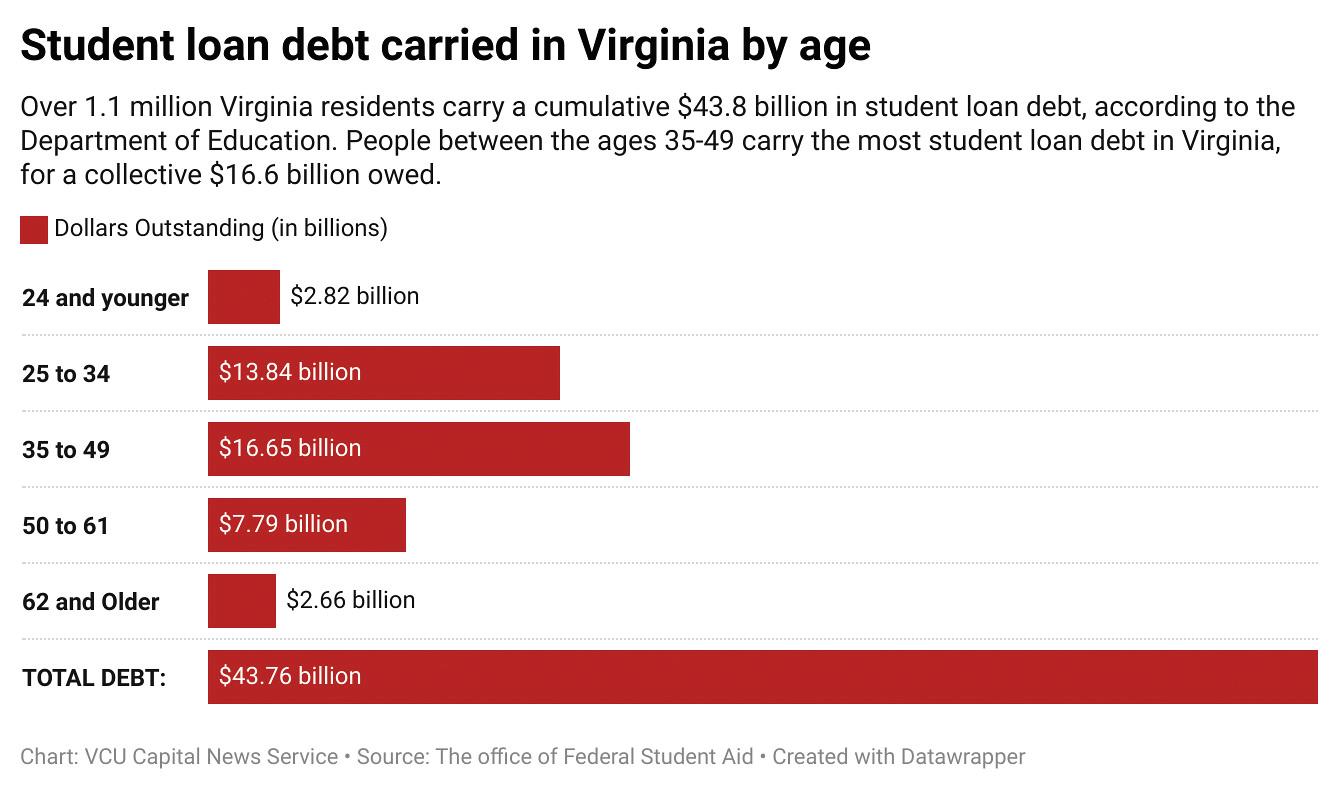
earnings from major industries, according to Collinge. Virginia’s combined soybean, chicken, pork and tobacco exports compete with the annual interest from these loans, he said.
In-state students have seen tuition costs rise in recent years, with an average of a 2% increase from 2024-2025. Some Virginia colleges and universities like Virginia Commonwealth University and Virginia State University have seen an over 4% increase in tuition and fees in that time.
This uncertainty and the rise of loan interest rates affects financial stability and career choices, according to Amy Pridemore, executive director for the VCU Financial Success Center.
People now wait longer to start

families and are unable to buy homes and cars, Pridemore said. Student loan debts take precedent over other debts like mortgages, which halts the ability to make major purchases that build assets and wealth over time.
“That means that money is not being sent elsewhere in the economy,” Pridemore said. “They might not have as much discretionary spending because there’s so much of their disposable income that is going to pay down these student loans instead.”
Student loan debt is one of the only forms of debt that cannot be cleared when someone files for bankruptcy. It is relatively easy to pile on the debt when in higher education because so few people are unaware of the implications of the loans they take
on, according to Pridemore.
“Even if you got rid of all of your other debt, student loans will live with you forever until they’re paid off,” Pridemore said. There are more borrowers over the age of 35 in Virginia, but they borrowed less money per person, according to the Department of Education. People over 35 owe $29 billion, nearly double the amount compared to people under 35 who owe nearly $16 billion.
Student loan debt affects people in a variety of professions. Even perceived high-paying careers like doctors struggle to repay the accumulated debt, according to Michael York, a registered nurse in Richmond. Student loan companies monopolize higher education, and many borrowers have little choice but to deal with it, he said.
“I don’t fault people for having to take student loans,” York said. “I just wish it wasn’t like for-profit companies that are giving out student loans and making money off people who are trying to further their education.”
The Trump administration has also been accused of taking borrowers’ tax refunds with no required notice to offset the student loans, according to Democratic Maryland lawmaker U.S. Rep. Jamie Raskin. This comes after the administration announced in April that it would resume collection activity after a half-decade pause due to COVID-19.


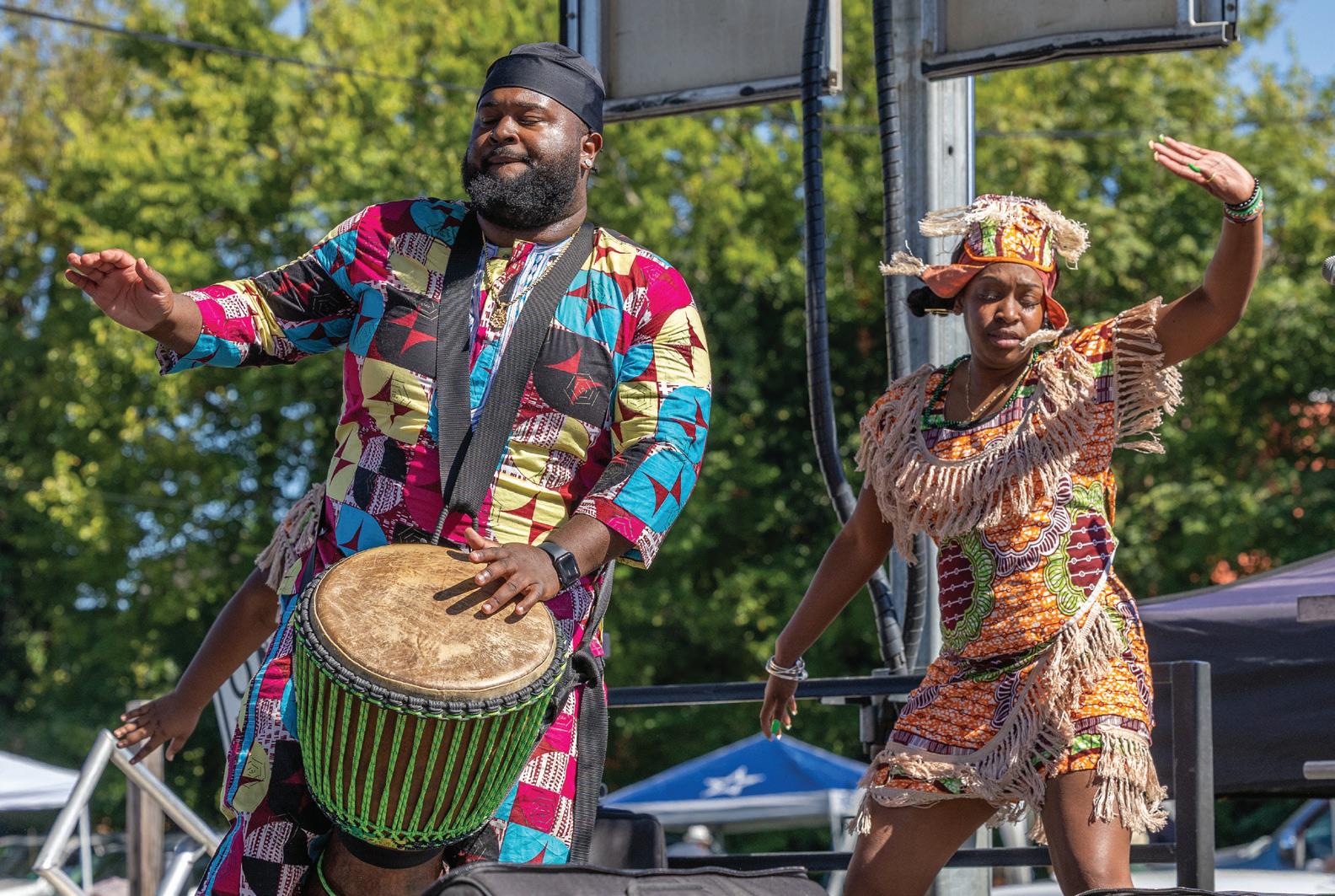



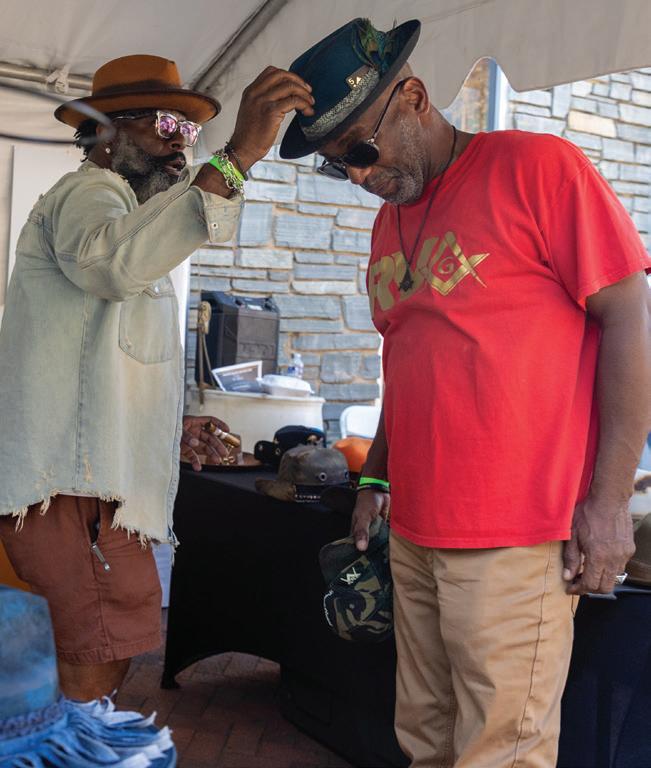





How can you tell it’s October in Richmond? Even without a calendar or a smartphone, a few signs stand out.
One is the annual showcase of the state’s agricultural products, complete with games, rides and shows: the Virginia State Fair. Another is the Second Street Festival, usually held the first full weekend in October and organized by Venture Richmond.
If those events don’t grab your attention, the Richmond Folk Festival typically lands on the second weekend of October. This year, it’s scheduled for Oct. 10-12. The Blackbyrds are performing and, if you’re old enough to be reading these words on paper, you might remember some of their jazz and funk hits such as “Walking in Rhythm” and “Rock Creek Park.”
For the calendar-challenged among us, there’s another sure sign: politics. Since this is an election year, as you might’ve noticed from the incessant advertising on TV and the internet, you don’t have to watch for cultural events. Just wait for the “October surprise” to appear. Then you know for sure.
If you’re unfamiliar with the term, an “October surprise” is any news or political development timed to hit in October as Election Day nears, meant to shake up the race at the last minute. It’s a deliberate plot twist designed to turn a contest on its head in the final weeks. This year, we’ve seen at least two in the statewide races so far.
On Oct. 1, news resurfaced about a now-deleted Tumblr blog that Republican candidate for lieutenant governor John Reid has denied owning. The blog was referenced months ago by Gov. Glenn Youngkin, who suggested Reid should leave the race. At the time, the public did not know the blog’s contents, which shared a username with other social media accounts linked to Reid. Now, we have a clearer picture.
The content on the blog, which has been called “pornographic,” is shocking and disturbing. There are themes of Nazism, white supremacy and sexual violence. Upon further review, it’s understandable why the governor raised concerns. Whoever is behind the promotion of these ideas should not hold elected office.
Then there’s Jay Jones, the Democratic candidate for attorney general. The son of longtime state Sen. Jerrauld Jones, he has come under fire for text messages sent in 2022 that joked about violent threats toward then-House Speaker Todd Gilbert and made unpleasant remarks about his family. The messages were not public at the time but are now. Jones has taken responsibility and apologized:
“Reading back those words made me sick to my stomach. I am embarrassed, ashamed and sorry. I have reached out to Speaker Gilbert to apologize directly to him, his wife Jennifer, and their children. I cannot take back what I said; I can only take full accountability and offer my sincere apology.”
A speeding ticket and his lack of consequences for driving fast, along with other alleged comments about law enforcement officers, have also been brought to light.
As jarring as these revelations about Nazis, violent threats and racism as fetish are, it’s unclear whether they will move the needle for Virginia voters. Early voting began days before some of these “surprises” surfaced. For many voters, neither scandal — or the public reaction to either — is likely to sway minds already made up.
So yes, it’s October in Richmond. Leaves are changing, festivals are rolling, and political scandals are dropping right on schedule. Whether these revelations actually matter to voters or become just more background noise in a deafening election cycle remains to be seen — along with the next surprise.

In my house, two legacies face each other.
On one wall hangs a reproduction of “The Spirit of ’76,” painted by my cousin Archibald M. Willard for the nation’s 100th birthday. The central drummer in that painting — the older man leading the trio — was modeled after Archibald’s father, my cousin too.
from that battlefield whose face we can still see.
That painting is the definitive picture of 1776: a battered but unbroken march for freedom and equality. My family is literally in the frame — and in the fight.
thing on freedom and equality.
He was right on the first count. And for a time, right on the second.
Reconstruction’s promise
After the war, Morgan served in Virginia’s House of Delegates from 1869 to 1871. He sat on Petersburg’s City Council and School Board.

“The Spirit of ’76” is America’s most famous Revolutionary painting — the definitive image of independence, instantly recognizable wherever it appears. First displayed at the Centennial Exposition in Philadelphia, it captured the mood of a nation celebrating its 100th year and looking back on its birth in revolution.
For my family, it is not just symbolic. My father descends from six officers in the Massachusetts Line of the Continental Army — and from a seventh, a 13-year-old fifer who fought at Lexington and Concord. He was the youngest combatant on that battlefield, carrying both a fife and a musket into the first fight of the Revolution. He lived into his 90s, long enough to be photographed — the only person
Across the room sits another inheritance: the desk of my mother’s great-great-grandfather, Peter G. Morgan, born enslaved in Nottoway County, Virginia, in 1817.
Beside it rests the courting set he bought so his three daughters, once freed, could welcome suitors in dignity.
My family isn’t just in the picture of 1776. We live the unfinished fight of 1876.
A wager for freedom
In 1864, while Petersburg was under Confederate siege, Morgan walked into a Confederate court and freed his wife and daughters.
Virginia law was brutal: Any Black person gaining freedom — and their family — had 12 months to leave the state. Fail to leave, and you could be seized and enslaved again.
So Morgan wagered exile — or even re-enslavement — if Confederate authorities got to them before the Union did. Still, he took the risk. He bet every-
He helped build schools, relief associations and even a bank. He believed that Reconstruction — America’s “second founding” — could finally make freedom and equality real.
But he also lived to see those hopes collapse.
The collapse came just after the hopeful celebration of 1876, with the Compromise of 1877 — a backroom deal to resolve the contested race between Democrat Samuel Tilden and Republican Rutherford Hayes. Republicans kept the White House by giving in to Democratic demands to pull federal troops from the South.
With the old Union soldiers gone, white supremacists unleashed murderous violence to retake power. Reconstruction ended not with a bang but a betrayal — and lynch mobs burning human flesh.
Twin revolutions
That is America in a nutshell: twin spirits, twin moments, both unfinished. 1776 was for freedom.
The warning is clear: Freedom and equality are fragile, and gains can be rolled back. Today, both are under attack again — with democracy itself on the line, racial equality undermined, and immigrants targeted with open hostility.
The charge is clearer still:
If my great-great-great-grandfather could bet on freedom and equality in 1864 while Petersburg burned — and my father’s ancestor could join his father and brothers in arms at Lexington — surely we can fight for freedom and equality in our time. The writer is a former national president of the NAACP.

The federal government shut down Oct. 1, and the impasse between congressional Democrats and Republicans suggests it could be a long one. Speaker Mike Johnson has already sent Congress home to do “district work.” That may be related to the fact that newly elected Democratic Congresswoman Adelita Grijalva adds another vote to the Democratic column but cannot vote until she is sworn in. Johnson says she will be sworn in only when Congress returns to session, which will not happen until Democrats vote to reopen government with a “clean” continuing resolution that changes nothing in the current budget.
Here’s the problem: People will receive notices about the cost of their health care sometime between October and early December, during the open enrollment period. They will have to make choices about their health plans and affordability — estimates suggest costs could rise between 10% and 15% and possibly more in some areas. How can people make rational decisions if they do not know how much they can pay? Premium tax credits embedded in the Affordable Care Act help millions afford coverage through the Marketplace. But these credits are set to expire at the end of 2025. Democrats want to extend them, and Republicans say they will “discuss” the issue once the government reopens. Republicans have a record of broken promises. Senate Mi-
nority Leader Chuck Schumer, D-N.Y., supported a Republican move in the spring, and it cost him both progressive support and leverage in managing the health care impasse.
If Congress fails to act before open enrollment begins Nov. 1, many Americans could suddenly face steeper, possibly unaffordable premiums or choose to drop coverage entirely, worsening health ac-
cess and market stability. And if premiums rise, some people will not be able to pay them. There are real consequences to denying health care. According to a Harvard University study, more than 45,000 people died in 2009 because they lacked coverage. While that study is dated, it provides a baseline.
Most low-income households will be hit hardest by premium increases. Because African Americans are more likely than others to be at the bottom of the income distribution, they are most likely to be affected. Given current economic instability, many families could face serious hardship. This urgency is one reason Democrats have united around extending health care subsidies. Republicans appear intent on wasting time and avoiding Democrats at the negotiating table. They are following the lead of President Donald Trump, holding government operations hostage.
The consequences of this showdown are immediate. Hospitals, particularly in rural and underserved areas already under financial strain, warn of funding
shortfalls. Some Medicaid programs and payments to providers are in limbo. Even if core functions like Medicare and Medicaid continue — they are mandatory spending and technically shielded — agencies that administer ACA marketplaces or support outreach could face disruptions. Meanwhile, uncertainty may rattle insurers and consumers, potentially causing premium surges, fewer plan options or coverage losses, especially in areas where costs were already high.
Republicans own this shutdown. They control both houses of Congress and the executive branch. Yet they are attempting to shift the narrative by claiming Democrats want to “give health care to undocumented immigrants.” Nothing could be further from the truth. Undocumented immigrants are not eligible for ACA subsidies or most federal health coverage, except for emergency care. Meanwhile, emergency rooms are closing. Where does this leave citizens, legal immigrants and undocumented people who need emergency care?
Is affordable health care a right and moral obligation or an afterthought? Should health care be a political football or a foundation of a humane society?
Partisanship around these issues ignores those who need coverage but are not in the same party as the oligarchs. Affordable health care should be nonnegotiable.
Democrats have drawn a line in the sand, and Republicans have, too. They are playing “chicken” with tens of thousands of lives. This is more than an ordinary shutdown; it is a matter of life and death.
The writer is an economist and author based in Washington.
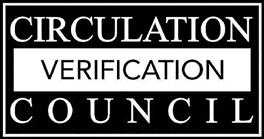



We certainly live in challenging times.
Shortly before RFK Jr.’s hand-picked CDC panel met last month to abandon its COVID-19 vaccine recommendations, Sen. Adam Schiff publicly asked insurers to cover routine vaccines for illnesses, no matter what the group recommended. I applaud Sen. Schiff for continually fighting the good fight.
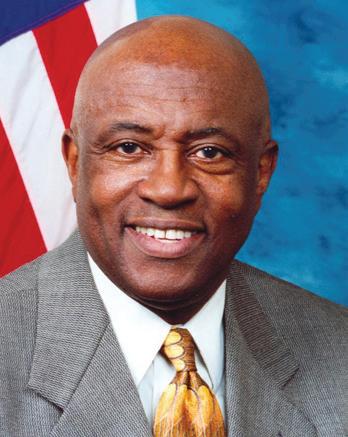
Throughout my time in Congress, I was also a lifelong advocate for health equity. I spent decades fighting to make health care more accessible in underserved communities like the one I represented in Brooklyn. It was both an opportunity and a challenge to fight these inequalities.
But lately, some of our health equity challenges are quietly morphing into crises right before our eyes. I’m talking about pharmacy deserts, which continue to expand as pharmacies close in our cities and surrounding neighborhoods.
Take Sen. Schiff’s efforts, for instance. If pharmacists aren’t around to administer vaccinations, insurance coverage of these COVID-19 shots won’t matter for the millions of Americans stuck in pharmacy deserts.
Pharmacies are closing at an alarming pace. Across America, CVS closed 900 stores between 2022 and 2024, and it will close 270 more stores in 2025. Walgreens is shuttering 1,200 stores, and Rite Aid, which recently filed for bankruptcy, closed more than 310.
I cannot sit on the sidelines and watch as pharmacies, the
lifelines of community health care, vanish before our eyes. These pharmacies are essential institutions that serve as trusted, accessible points of care for millions of families with nowhere else to turn.
Nationwide, local drugstores are shutting their doors. These aren’t just a loss for businesses big and small; they are a loss for entire communities. For many,
especially in under-resourced areas, these pharmacies are where people fill prescriptions, get vaccinated, manage chronic conditions and ask health questions they can’t afford to take to a doctor. They’re a pillar of public health.
So why is this happening?
One major reason is a coordinated attack by the pharmaceutical industry on the very companies — the so-called middlemen — that help keep drug costs down. These are the organizations that negotiate discounts, enable mail delivery and manage the logistics that make medicine more affordable and accessible. Despite their role in lowering prices, they’re being blamed in ads, in
the press and in legislation. But without them, drug prices will rise and the pharmacies serving vulnerable neighborhoods will keep disappearing.
When lawmakers pass bills that strip away these providers’ ability to negotiate or operate pharmacies, the effects are swift and severe. Just look at Arkansas, where a new law is shutting down pharmacies and cutting off health care access in communities already struggling to meet basic needs. Other states are considering similar legislation, and minority communities will be hit first and worst.
This expanding patchwork of pharmacy deserts is not just inconvenient. It is a looming public health emergency that puts our communities at risk. Already, one-third of neighborhoods in major U.S. cities lack a local pharmacy, and those hardest hit are Black and Hispanic communities. If this trend continues, millions more will lose access to medications they need to stay healthy, manage diabetes or heart disease, or treat depression and anxiety. The list goes on.
We can’t afford to let that happen. Yes, our medicines must be cheaper. I am a lifelong Democrat. And when Republicans and

The Greater Richmond Transit Company (GRTC) has proposed a 10% Disadvantaged Business Enterprise (DBE) participation goal for Federal Fiscal Years 2026–2028 for all Federal Transit Administration (FTA)-funded projects.
Details regarding this goal and how it was established are available for review online at tinyurl.com/grtcdbe or in person between 8 AM4:30 PM, Monday – Friday, at GRTC Headquarters located at 301 E. Belt Blvd, Richmond, VA 23224. Written comments, questions, or inquiries regarding the proposed goal will be accepted for thirty calendar days starting October 1, 2025, ending on October 30, 2025.
GRTC Disadvantaged Business Enterprise (DBE) Goal Methodology Seminar Date: October 14, 2025
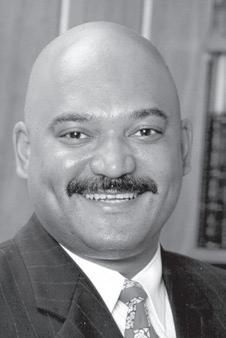
Meeting link: tinyurl.com/dbemeet Time: 2:00 PM (Online)
GRTC will host an online seminar to present the methodology for establishing the proposed Disadvantaged Business Enterprise (DBE) goal for upcoming projects. This seminar will also provide an opportunity for the public to ask questions and submit comments regarding the proposed DBE goal.
Please email comments to supplierdiversity@ ridegrtc.com.
GRTC’s DBE goal of 10% will become final after the public comment period ends unless amended.
FACILITY Notice is hereby given that the Richmond Redevelopment and Housing Authority (the “Authority”) will hold a public hearing on the request of ECG Rady, LP (the “Borrower”), whose address is 1030 16th Avenue South, Suite 430, Nashville, Tennessee 37212, for the issuance by the Authority of a maximum stated principal amount of $40,000,000 of its revenue bonds (the “Bonds”), in one or more series, at one time or from time to time, in order to finance or refinance a portion of (a) the cost of acquiring, constructing and equipping a multifamily residential rental housing project to consist of approximately 4 buildings containing approximately 288 units and a clubhouse, to be known as Rady Flats (the “Project”), to be located on approximately 22.8 acres of land at 281 Rady Street in the City of Richmond, Virginia, (b) the funding of reserve funds as permitted by applicable law and (c) certain of the costs incurred in connection with the issuance of the Bonds (collectively, the “Plan of Finance”). The Project will meet the requirements of a qualified residential rental project within the meaning of Section 142(d) of the Internal Revenue Code of 1986, as amended. The Project is expected to be owned and operated by the Borrower or a party related to the Borrower. The public hearing on the Plan of Finance, which
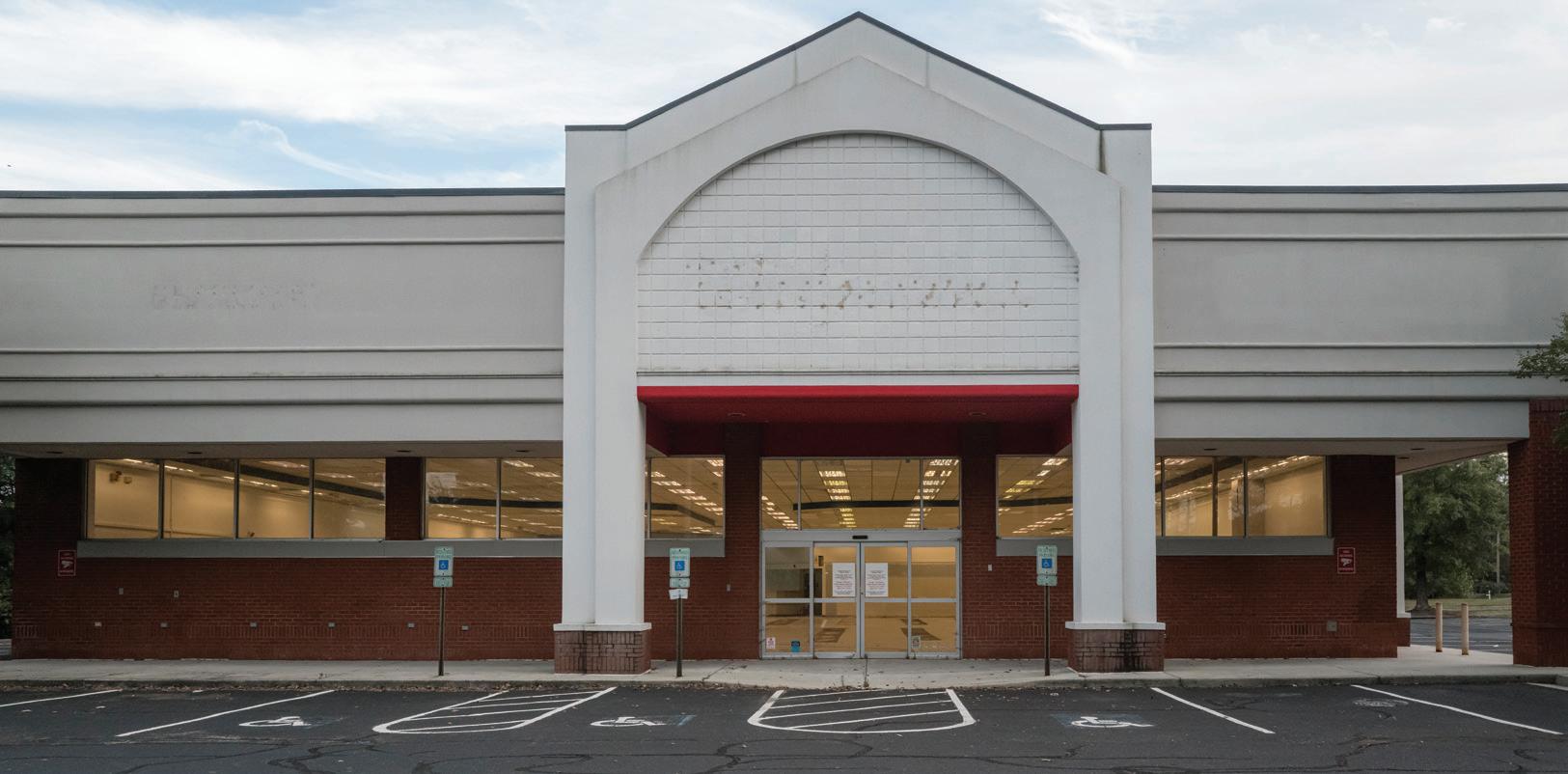
President Donald Trump are wrong, I hold them accountable. As such, the president deserves some acknowledgment with his recent executive order that aims to stop big drug companies from charging Americans the highest prices in the world — as did President Joe Biden, who fought to allow Medicare the power to negotiate lower drug prices. But the real problem is
that big drug companies are responsible for high drug prices, not the companies working to deliver medications affordably and efficiently. Tearing down the system that negotiates lower drug costs is like smashing a fire alarm because it’s too loud. It doesn’t stop the fire. It creates chaos and puts more people in danger.
Let’s stop attacking the parts of the system that are helping people — parts that our everyday communities rely on. Let’s protect the pharmacies, services and tools that keep our most vulnerable neighbors connected to care. Because once a pharmacy leaves a neighborhood, it rarely comes back, and the consequences can last a lifetime. The writer is a former congressman.

VIRGINIA DEPARTMENT OF TRANSPORTATION
Request for Qualifications
Contract ID #: C00 1 16201DB126
Request for Qualifications
Contract ID #: C00125602DB146 I-64/I-264 Interchange Phase III-A Design-Build
The Virginia Department of Transportation (VDOT) is seeking Statements of Qualifications for the I -81 CIP Exit 143 to Exit 150 Widening design-build project from qualified and experienced respon dents with design and construction experience of highway facilities. The Project is located along Interstate 81 between approximate ly Mile Marker 143.0 in Roanoke County and approximate Mile Marker 151.7 in Botetourt County Virginia The project adds a third lane to northbound and southbound I -81 beginning near the Exit 143 interchange and ending north of the Exit 150 interchange. The total project length is approximately 8.7 miles. Project improvements include, but are not limited to, the following: an additional lane on both northbound and southbound Interstate 81 ; two bridges replaced over Route 1836 (Belle Haven Road); two bridges replaced over Route 648 (Reservoir Road); two bridges replaced over Tinker Creek and Norfolk Southern Railway; two bridges replaced over US Route 220 (Roanoke Road)
The Virginia Department of Transportation (VDOT) is seeking Statements of Qualifications for the I-64/I-264 Interchange Phase III-A Design-Build Project from qualified and experienced respondents with design and construction experience of highway facilities. This project is located in the Cities of Norfolk and Virginia Beach, VA. The scope includes the widening of I-64 East from four to five lanes between Northampton Boulevard and I-264, adding a high occupancy tolled, part-time shoulder Express Lane from Northampton Boulevard to the Twin Bridges over the Elizabeth River, and replacing the existing flyover ramp from I-64 East to I-264 East with a two-lane ramp that will connect to the collector-distributor (C-D) lanes being widened on I-264. Additionally, bridge widening will occur at the I-64 East bridges over Kempsville Road and Virginia Beach Boulevard and on the inner I-264 bridge over Newtown Road. The work includes all work required for project management, design and construction of the project.
Questions/clarifications regarding the Request for Qualifications (RFQ) should be submitted to Bryan W. Stevenson, P.E., DBIA (Bryan.Stevenson@vdot.virginia.gov).
Copies of the RFQ and additional submittal requirements can be found at Bid Express (bidexpress.com). The Department assures compliance with Title VI requirements of non-discrimination in all activities pursuant to this advertisement.
The work includes, among other things all work required to support the design and construction of: (a) roadway; (b) survey; (c) structure and/ or bridge; (d) resurfacing of existing asphalt pavement ; resurfacing, repairing, rehabilitat ing (rubblizing, unbonded overlay), and/or removing of existing concrete pavement ; (e) environmental (f) geotechnical; (g) hydraulics; (h) stormwater management; (i) traffic control devices; (j) transportation management plan; (k) right -of -way; (l) utilities; (m) public involvement/ relations (n) quality assurance and quality control; (o) Intelligent Transpor tation Systems; (p)railroad; (q) construction engineering and inspection; and (r) overall Project management.


By Hayden Braun Capital News Service
Wealthy Virginians used to travel to NFL games in Washington aboard a 1919 luxury rail car now displayed at the Science Museum of Virginia in Richmond.
Railcar ONE, pronounced “Car Oh-N-Ee,” is fitted with bedrooms, a dining room, a kitchen, showers and an observation deck. The train was the equivalent of taking a corporate jet today, according to Elli Bosch, the science content and research specialist at the museum.
Richmond, Fredericksburg and Potomac Railroad bought the Pullman Green car from American Car and Foundry in 1936 and changed the name, which was Berwick.
“The car was used by VIPs,” Bosch said. “That may have included the RF&P president or other company officials, legislators or government officials, or clients.”
The company even held a block of nearly 600 season tickets to Washington games, according to Bosch. When RF&P discontinued its operation of special trains in 1971, it relinquished the season tickets but kept a dozen to entertain clients such as legislators and business leaders.
Times have changed. The team was
renamed the Washington Commanders in 2022 and now plays in Maryland.
The train was retired in 1991.
But a Washington commute is once again on fans’ minds with the recent announcement that the team will return to a redeveloped Robert F. Kennedy Stadium in 2030.
The estimated $3.7 billion project to bring back the Commanders was approved by the D.C. Council.
The stadium will seat about 65,000 people, alongside new housing, retail and green space, according to a news release from Mayor Muriel Bowser.
The commute could be more convenient for fans than the notoriously difficult trip to FedEx Field in Landover, Maryland.
“I think if they can do something with the Metro, it would make it much easier, rather than trying to go through all that traffic to Landover,” said Ben Heltezel, an avid Commanders fan.
“One of the best sporting experiences I’ve ever been to was in Spain, in Madrid, and just the way that they use the train to get over there was super effective and smart.”
Carlos Olmos Jr., a fan from Alexandria, said the return to RFK will make games more convenient to attend.
“There are a lot of Commanders fans that are in the Richmond area and the Alexandria area that don’t

Free Press staff report
The Virginia Union University men’s cross-country team placed fifth out of 13 schools at the HBCU Challenge on Oct. 3 in Cary, North Carolina, led by medal-winning runs from freshmen Rodgers Korir and Darryl Hawkins Jr. Korir finished fifth overall in the men’s 8K with a time of 25:06.9, while Hawkins placed 12th in 26:29.6. Freshman Keon Koonce came in 22nd at 27:26.9, followed by freshman Jonathan Holton in 40th (30:39.3) and sophomore Chase Burke in 47th (31:50.9).
The Panthers totaled 126 points, marking the third straight year they have placed fifth at the event.
“While finishing fifth out of 13 schools isn’t our ultimate goal, it reflects our competitive spirit,” head coach Franck Charles said. “We have challenges ahead, but I have unwavering confidence in this team.”
VUU will next compete in the VSU Cross Country Challenge on Friday at Virginia State University in Ettrick.
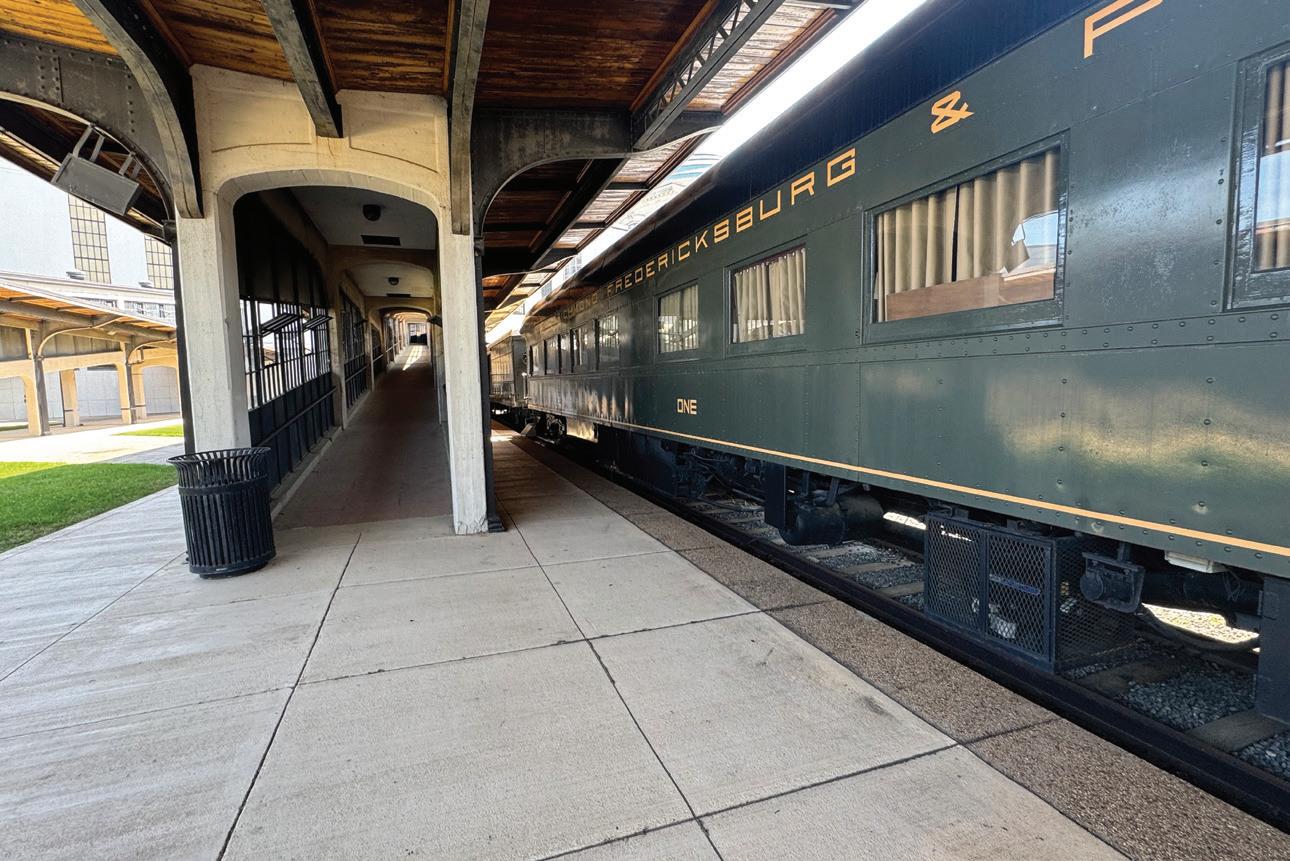
really go all the way up to Landover because it’s kind of a hike,” Olmos said. “It’s kind of a hassle to get to Landover using the Metro.”
The stadium is accessible by public transit, Bowser said in a release. The current Stadium Armory Metro stop was used by the old stadium. The District will invest $202 million for utilities infrastructure, roads and a Washington Metropolitan Area Transit Authority study, according to Bowser’s release.
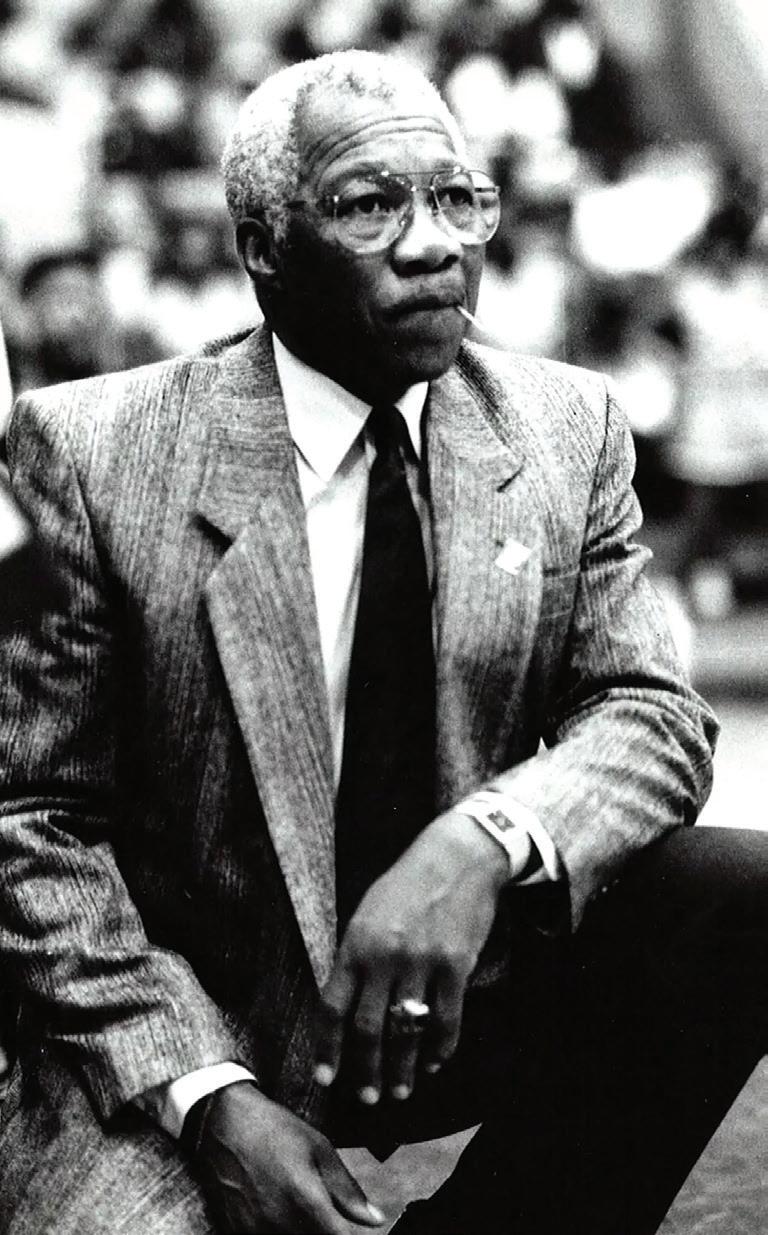
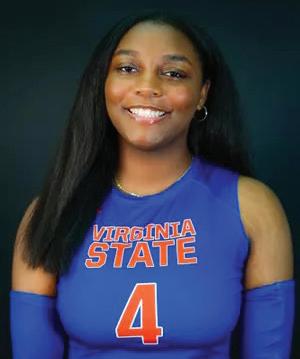
Free Press staff report
Fifteen college football standouts of Hispanic heritage were named Wednesday to the first-ever watch list for the Hispanic College Football Player of the Year Award.
The list, released by the Hispanic Football Hall of Fame, highlights athletes who have secured starting roles this season and who are making an impact on and off the field.
“Shining a light on Hispanic athletes who are already proving themselves on some of the biggest stages in college football is exactly why we created this watch list,” said Ron Rivera, a founding board member of the Hall.
“These athletes are not just outstanding performers on the field, they’re role models for countless young people who see themselves in their success,” said fellow board member Anthony Muñoz. “The college watch list is a powerful way to celebrate heritage, talent and the bright future of Hispanic football.”
The 2025 watch list is made up of Tennessee quarterback Joey Aguilar; USC offensive lineman Micah Bañuelos; Arkansas offensive lineman Fernando Carmona; Texas A&M wide receiver KC Concepcion; Alabama tight end Josh Cuevas; Arizona State kicker Jesus Gomez; New Mexico State linebacker Tyler Martinez; Indiana quarterback Fernando Mendoza; Ohio quarterback Parker Navarro; Vanderbilt quarterback Diego Pavia; Penn State wide receiver Trebor Peña; San Diego State kicker Gabriel Plascencia; Texas Tech linebacker Jacob Rodriguez; Penn State linebacker Tony Rojas; and Notre Dame defensive lineman Gabriel Rubio. The Hispanic College Football Player of the Year Award will be presented at the conclusion of the season.
Some fans want an even closer stadium stop, and some residents think a station on the north side of the stadium campus is needed regardless of whether the stadium is even built. Officials “may be looking to expand other transit options,” Bowser told WTOP.
Capital One Arena, home to the Washington Wizards and the Washington Capitals, is located near Metro stations that provide direct access to the arena and downtown area. It trades
Free Press staff report
Former Norfolk State University men’s basketball coach Charles Christian, a Richmond native and Armstrong High School alumnus, will be posthumously enshrined into the Hampton Roads Sports Hall of Fame this November. Christian left a legendary mark on Spartan basketball and the region’s athletic landscape.
Christian spent 14 seasons at the helm of the Spartans across two stints (1973-78, 1981-90). He remains the winningest men’s basketball coach in school history, compiling a remarkable career record of 319-95 (.770 winning percentage).
Under his leadership, Norfolk State captured seven CIAA Tournament championships and recorded
Free Press staff report
Virginia State split a doubleheader with Winston-Salem, improving the Trojans’ record to 5-8 overall and 4-1 in CIAA play.
Gracie Darville led the Virginia State offense with nine kills and a .474 hitting percentage in the first match, while Kellee Craig anchored the defense with 14 digs. Skylar Johnson added a team-high
the dead parking lot of Landover for a lively Metro crowd and is more convenient, Olmos said.
“When I go to a Wizards game or a Capitals game, I just go to Capital One Arena,” Olmos said. “So I just go on the Metro and me and a couple buddies and it’s cool, we get there and then it’s just easy.”
For the moment, Amtrak will not play a role in connecting the broader Virginia fan base to the new RFK stadium until other projects are finished. The stadium and the Long Bridge Project are not expected to finish construction until 2030, according to the Virginia Passenger Rail Authority and the NFL.
When asked if Amtrak would expand service once the Commanders are back at RFK, public relations manager Beth Toll said in an email that there would not be added service in the short term.
“In the short term, there will not be any additional service as a result of the new RFK in D.C. because we cannot expand any service to/from Virginia until the Long Bridge Project is complete,” Toll said. “Additionally, all of the projects along the I-95 corridor (not New River Valley or Ettrick) need to be completed before we can expand service between Washington and Richmond.”
11 seasons with at least 20 victories. His teams also earned three NCAA Division II regional championships, advancing to the national quarterfinals on each occasion.
Christian’s excellence on the sidelines was recognized with four CIAA Coach of the Year honors. He was named one of the 12 coaching legends in CIAA history by ESPN.com and was previously inducted into the Hampton Roads African American Sports Hall of Fame and the NSU Athletics Foundation Sports Hall of Fame.
The Hampton Roads Sports Hall of Fame, located at Chartway Arena in Norfolk, honors athletes, coaches and contributors who have brought national recognition to the region through sports. The Hampton Roads Sports Hall of Fame dinner will take place on Nov. 19.
two aces, and Daisy Pentorn recorded 10 assists to help the Trojans secure a 3-0 sweep.
In the first set, Virginia State jumped out to a 25-15 win, never trailing by more than five points. After two early lead changes, the Trojans seized control at 7-6 and maintained the advantage, supplementing their attack with three aces.
The Trojans rolled to a 2516 victory in the second set, opening up a nine-point lead
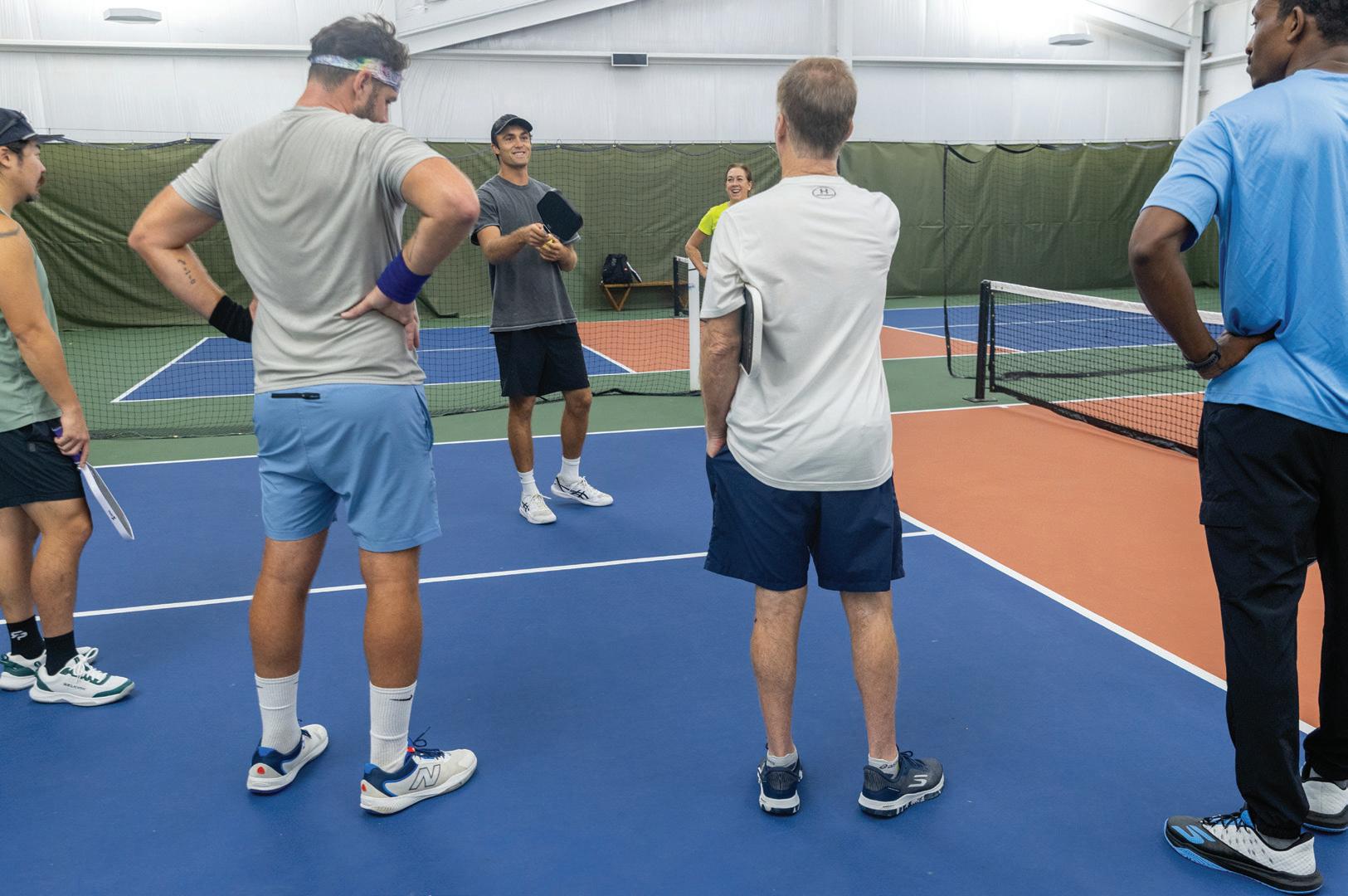
Growing up in Blackwell on South Side, Anthony Clary rarely saw Black people running or exercising. Now, as founder of WeOffTheCouch, he’s working to change that reality. Through his community-based running and fitness group, Clary is tackling health disparities in marginalized communities like the one where he was raised.
WeOffTheCouch does exactly what its name suggests: gets people off the couch and moving. The group fosters wellness, body positivity, camaraderie and fun — building a sense of belonging with every run.
“My goal is to be able to run in and through certain neighborhoods so people can see Black people running,” Clary said. “I want everyone to know about the joys of moving around outdoors.” Clary knows firsthand the benefits of exercise for overall well-being. Overweight and diagnosed as pre-diabetic in 2015, he began running with his former college football teammate to lose weight. Soon, there were five runners, then seven, and the number exploded to hundreds during the pandemic, when people sought outdoor social activities. Clary was over 100 pounds lighter and much healthier by then.
According to the Virginia Department of Health (VDH), Black adults in the state face the highest rates of asthma, chronic kidney disease, chronic obstructive pulmonary disease, diabetes, hypertension and stroke. These disparities highlight an urgent need for targeted public health interventions in Richmond, including healthy living resources to combat obesity — a root cause of many of these conditions.
“At WeOffTheCouch, we’re
able to move together is how we can accomplish a lot. I want people to just walk out of their doors when they see us running through their neighborhoods and join us.”
As a social worker, Clary works to secure housing for medically vulnerable people at risk of dying on the streets. On weekends, he counsels underprivileged youth. He brings that same dedication to empowering people to WeOffTheCouch.
“We’re about personal growth and empowerment,” Clary said. “We volunteer at homeless shelters. We designate people to pick up trash while we run, so we can leave communities better than we found them, and we work with kids and their families to heal the generational trauma in our communities.”
That kind of community intervention helped Clary in his teenage years, when his brother was shot and killed during a robbery. Mentors helped him find a way out of depression by continuing to show up for him, even when he didn’t want them to. They helped him with college applications and ignited the love of making music that he now enjoys as a balance in his busy life.
“If it wasn’t for them, life would be drastically different for me,” Clary said. “At WeOffTheCouch, I see people’s lives changing, too.”
Where were you born?
Plainfield, New Jersey. I moved to Richmond soon after I was born.
Where do you live?
South Side.
What’s your educational

University in marriage and family counseling.
Tell us about your family.
I have a 16-year-old daughter, twin 13-year-old boys and a 10-year-old daughter.
What is WeOffTheCouch?
We are a community-based running and fitness community that encourages people of all ages and fitness levels to participate. We’re a nonprofit organization working to enhance well-being through our three-pillar approach: to connect marginalized communities, forging bonds that build trust and belonging; to contribute to creating safe and inclusive environments and actively strengthen the communities we serve; and to help our participants conquer fears, overcome access barriers and build confidence. What is WeOffTheCouch’s
on a quarterly basis. We provide marathon training at no cost and more. Everyone should have the ability to run, regardless of their circumstances. Now, our mission has expanded to include personal and community empowerment.
Why did you create WeOffTheCouch?
I founded WeOffTheCouch because I saw the benefits of running and could see how it could benefit others. Running can be expensive, though. A lot of people can’t afford good running shoes, which start at $160, so we help those who can’t afford running-related expenses. How many runners are in WeOffTheCouch?
We have 1,700 members now. Where does WeOffTheCouch run?
We start at Blackwell Elementary School, but we run in different parts of the city. On Mondays, we have WomenOffTheCouch, a three-mile run, trot or walk that starts at 5:30 p.m. Wednesdays are co-ed, with two- and five-mile options available, also beginning at 5:30 p.m. On Saturdays, we do the same as Wednesdays, starting at 8 a.m. in the summer and 9 a.m. in the winter. What other programs do you offer?
We offer financial support. Race entries start at $75 and increase from there, making it cost-prohibitive. It’s hard for people who are living paycheck to paycheck. We don’t think anyone should not have access
started OffTheCouch Cares, where we offer a lot of community-based support, including volunteering at CARITAS. We meet people where they are and find ways to help them.
How can people get involved with WeOffTheCouch?
Just show up. You can find us on Facebook, Instagram or TikTok. You can send us an email through our website. Also, we use the HALO app to provide updates and information.
Share some examples of how WeOffTheCouch makes a difference.
At the Run Richmond 16.19
Race, I saw parents watching their kids cross the finish line, and I got choked up. Parents get involved because the kids are involved. They start running and walking, too. I’ve seen smokers who’ve joined us and quit smoking, and I’ve seen diabetics come off their medications.
What is your vision for WeOffTheCouch?
I want to take the program and hit copy and paste into other neighborhoods around the country. I want to go to Newport News next.
What are the biggest challenges facing WeOffTheCouch?
Funding. Black nonprofits are severely underfunded. There are numerous systemic issues within Black nonprofits. If you don’t have the funding, you can’t serve the needs you’re trying to meet. Leaders burn out at around five years. If I didn’t have the team that I have, I wouldn’t be able to do any of this. How is WeOffTheCouch funded?
Partnerships and donations. I’m grateful for our partners.
mission. Brooks, Relay, Pacers Running, NASCAR, Outdoors for All, HCA VA, J&A Racing, the Djimon Hounsou Foundation, the Boston Marathon, Sports Backers, Richmond Road Runners Club and Evo Sports Collective.
What kind of gear do you recommend for running?
Good running shoes. Go to a running store and have them test your run gait to get the right shoes. Also, get the proper clothing. Are there volunteer opportunities?
Absolutely, we need volunteers for our marathon training team, and we always need help with the hydration. We also need help with events.
Do you have any upcoming events?
We are participating in the Richmond Marathon on Nov. 15. How do you start the day? I start the day by praying and meditating and thanking God for another breath. I help my kids prepare for a successful day and get them out the door for school.
Who is your dream dinner party guest?
Barack Obama.
What is a quote that inspires you?
“True success isn’t measured by the value that you add to yourself, but by the value you add to others around your community.”
What is a book that has influenced you?
“Cry Like a Man: Fighting for Freedom from Emotional Incarceration,” by Jason Wilson. What do you listen to when you run?
Lecrae, 2Pac and 1980s-’90s R&B.
What are you currently reading?
“The Way of the Superior








Free Press staff report
The Richmond Folk Festival will highlight Virginia’s rivers this year with a special film screening and launch party on Thursday, Oct. 9, ahead of the festival, which runs Friday through Sunday, Oct. 10-12, at Brown’s Island and the downtown riverfront.
The Virginia Folklife Area theme, “Riverlore,” explores life on, under and along Virginia’s rivers, including the James River. Guests include fly-fishers, Indigenous potters, a decoy carver and James Eskridge, mayor of Tangier. The program is presented by the Virginia Folklife Program of Virginia Humanities and the James River Association, with curatorial support from local filmmaker Justin Black of Headwaters Down.
Katy Clune, Virginia state folklorist and director of the Virginia Folklife Program, said the rivers are “an elemental foundation of Virginia culture … which we still tell stories about today.”
The James River Association will present
environmental education displays and panels, including “The Great Return: Atlantic Sturgeon & Migratory Fish,” featuring fish biologists from the U.S. Fish and Wildlife Service as well as VCU research faculty and representatives from the Upper Mattaponi and Pamunkey tribes.
The launch event at Starr Hill Beer Hall & Rooftop, 3406 W. Leigh St., runs from 6 to 8 p.m. Thursday. It includes screenings of three short films: “Reclaiming the River: African American Life on Historic Rivers,” by Horace Scruggs III; “Ancient New: Exploring the Oldest River in North America,” by Tom Hansell, Trevor McKenzie and Julie Shepherd-Powell; and “ALL FORWARD!
Becoming an Urban Raft Guide,” by Justin Black. The films will be followed by a discussion with five Riverlore artists.
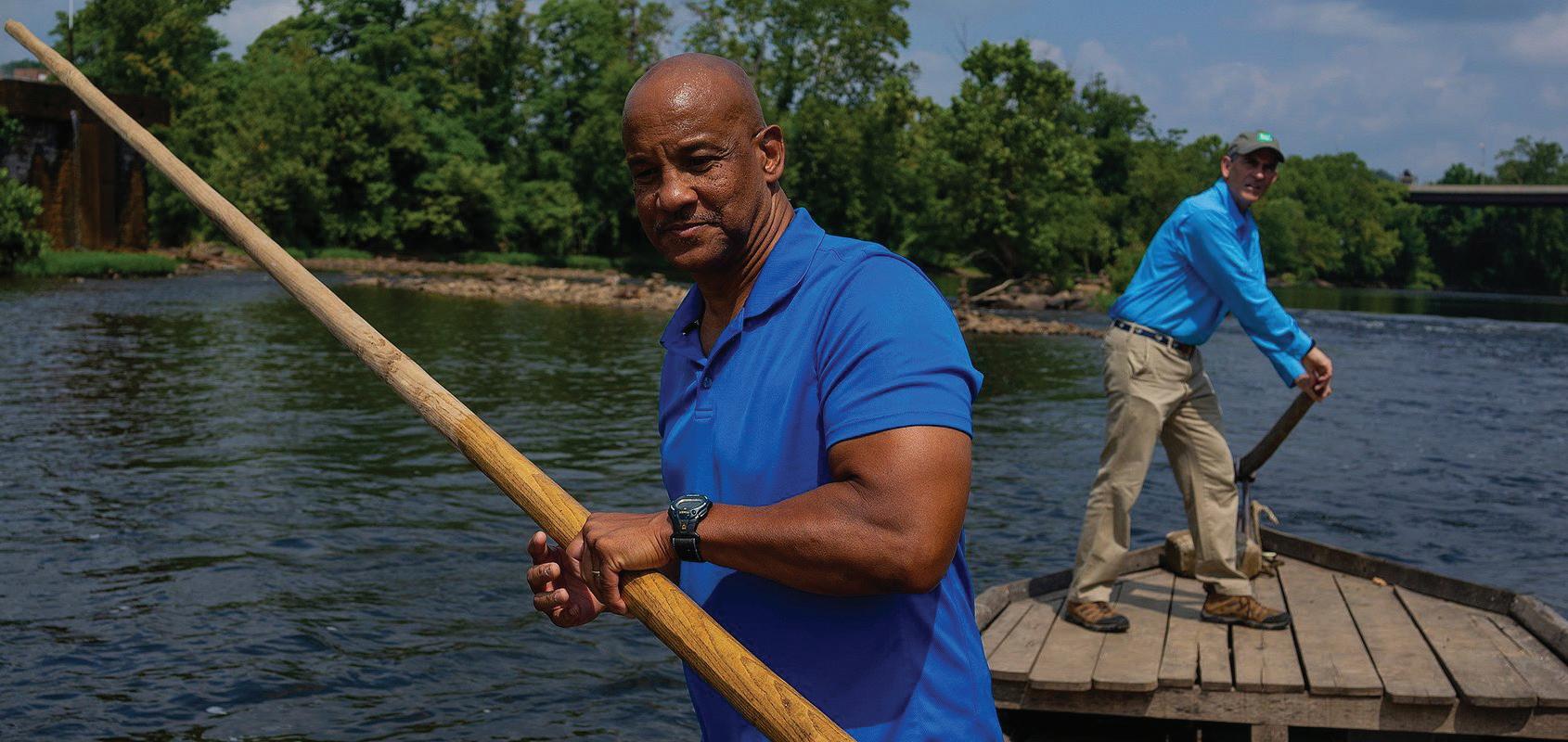

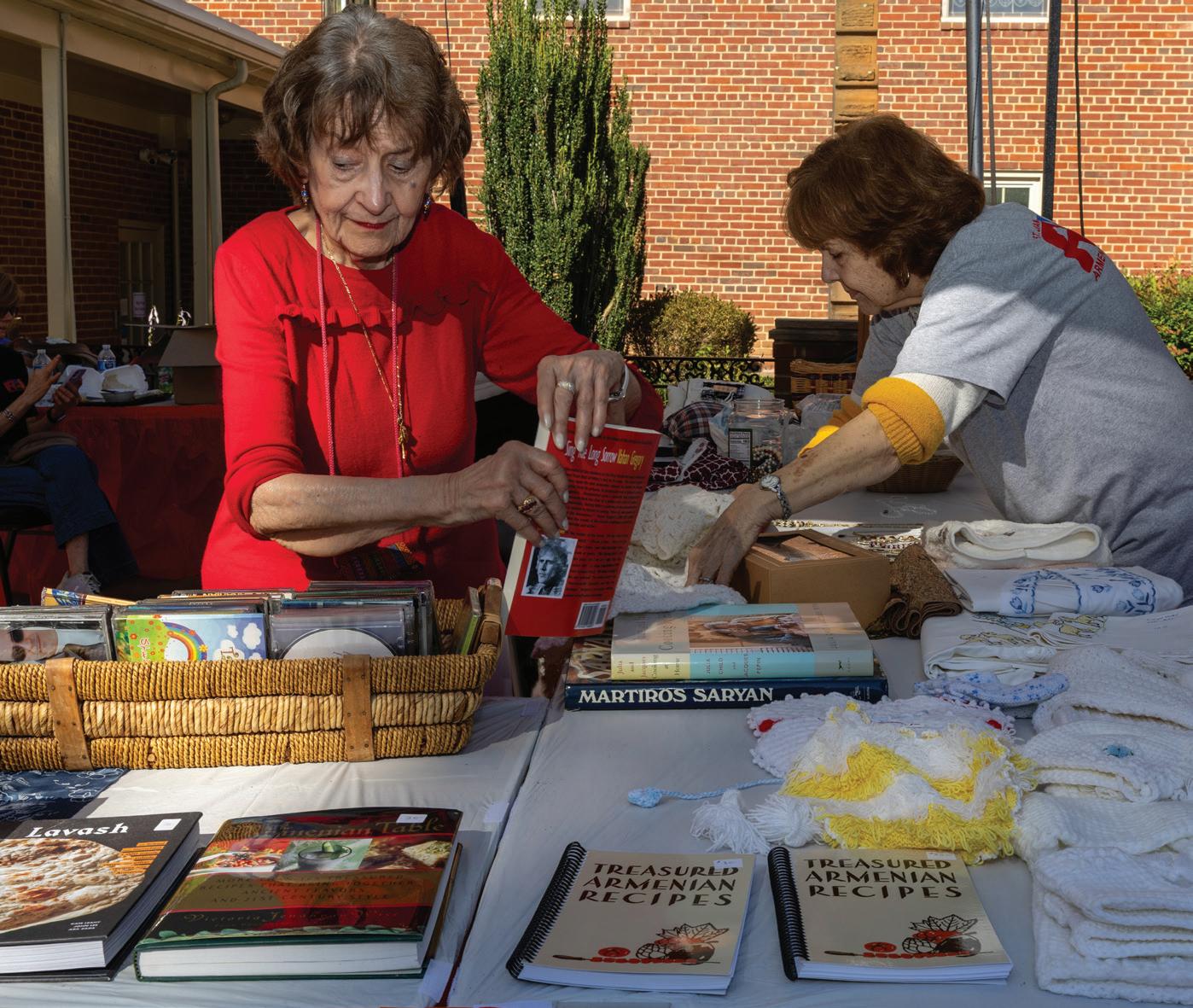


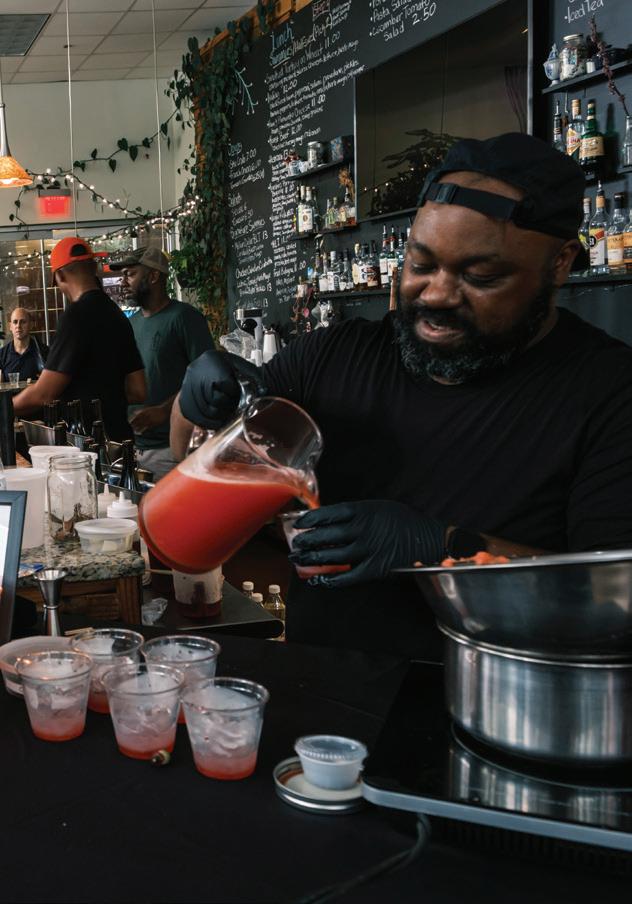
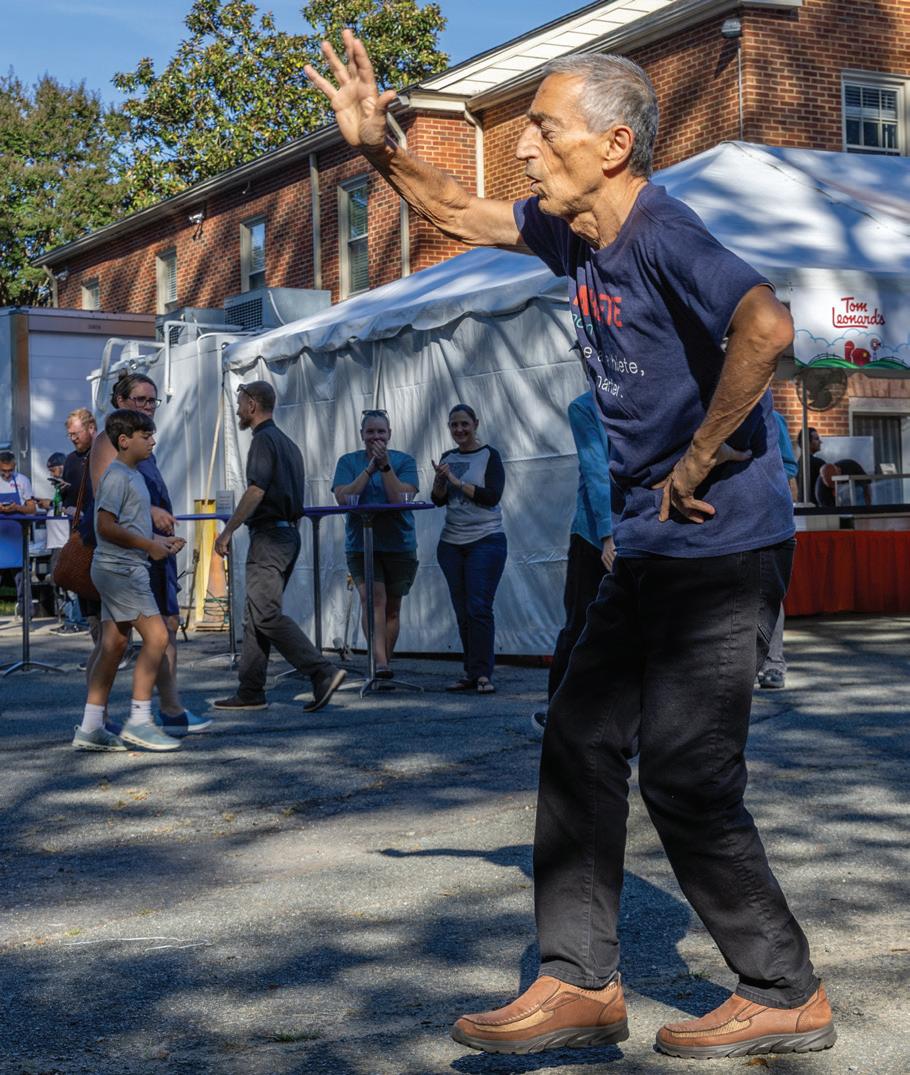


Join us for a symposium inspired by our “House to Highway” exhibition, with discussions exploring themes of urban renewal, historic preservation and Black history.
Saturday, Oct. 25 | 9 a.m.– 4:30 p.m.
Library of Virginia | Free | Registration is required

The screening and discussion are free to the public. More information on the launch event and the Riverlore theme is available at VirginiaFolklife.org. lva.virginia.gov/events/exhibitions/house-to-highway/symposium
By George Copeland Jr.
For generations of Richmond residents, John W. “Casey” Jones Sr. helped keep their teeth clean and smiles bright. The dentist, who served the community for decades, remained dedicated to his work until his death Monday, Sept. 29 at age 83.
“His practice was his ministry,” Jones’ son Vaughan Jones said. “It was a very poetic end to a majestic life.”
Jones was born Feb. 25, 1942, in Henrico County to Warner M. Jones Sr. and Carol Carney Jones. The second of four children, he earned the nickname “Casey” for his baseball skills, a nod to the Ernest Thayer poem “Casey at the Bat.”
Despite his athletic potential, Jones showed an early interest in medicine.
“He said as early as his freshman year in high school he was going to be a dentist, and that’s just what he did,” Vaughan said, quoting one of his father’s cousins.
After graduating from Virginia Randolph High School in 1960, Jones enrolled at Virginia Union University, beginning a more than 10-year journey in medical education.
Before earning a bachelor of science degree in 1964, he
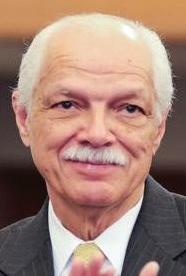
Dr. Jones
joined the Alpha Gamma chapter of Kappa Alpha Psi fraternity, worked summer jobs in Atlantic City and met his future wife, Diane Dorthea Jones.
The couple married in 1967, and Jones went on to earn a doctorate from Howard University’s College of Dentistry in 1974.
When Jones returned to Richmond, he joined other dentists serving those in need through the Richmond Community Action Program. The experience helped him build connections that would last for decades.
“He was trustworthy, he was honest and he was the same person, no matter where you saw him and when you saw him,” said Randy Adams, former president of the Old Dominion Dental Society (ODDS) and a former business partner of Jones who worked alongside him in RCAP.
Jones’ years of training and experience allowed him to hit the ground running when he opened his first dental practice in 1976. His work left a lasting impression on those around him, including his daughter-in-law, Audra Jones, who changed her
Wisdom Watch Alliance will host a free community screening of the documentary “Remember Me: Dementia in the African American Community” on Saturday, Oct. 18 at 10 a.m. at Real Life Ministries COGIC, 113 Wilkinson Road. The event will include a panel discussion with health care professionals, caregivers and community leaders as well as a limited number of free, confidential cognitive screenings conducted by clinicians.
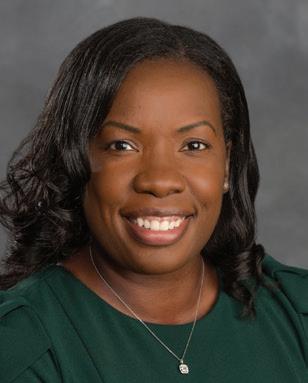
partners,” Brown said. “Additionally, the documentary breaks down barriers and creates a safe haven to have long overdue conversations.” Brown said Richmond is a meaningful location for the screening.
“This screening is especially significant to me because Richmond is the birthplace of my grandmother, who died with dementia. With dementia a leading and growing cause of death in the Richmond metropolitan area, this event provides vital resources for the region,” he said.
Filmmaker C. Nathaniel
“Chuck” Brown produced the documentary to highlight the impact of dementia on Black families, a subject often considered taboo.
“My purpose for producing ‘Remember Me: Dementia in the African American Community’ was to educate the community about a topic that has been seen as taboo in the Black community and to pro vide a voice for people living with dementia and their care
Panelists will include Brown; Dr. Anika Hines of the VCU School of Medicine; Dr. Linnie Carter, a caregiver and higher education leader; Deonte Barkley, a Richmond financial literacy expert; and Dr. Stephen B. Towns Sr., a faith leader and community advo-

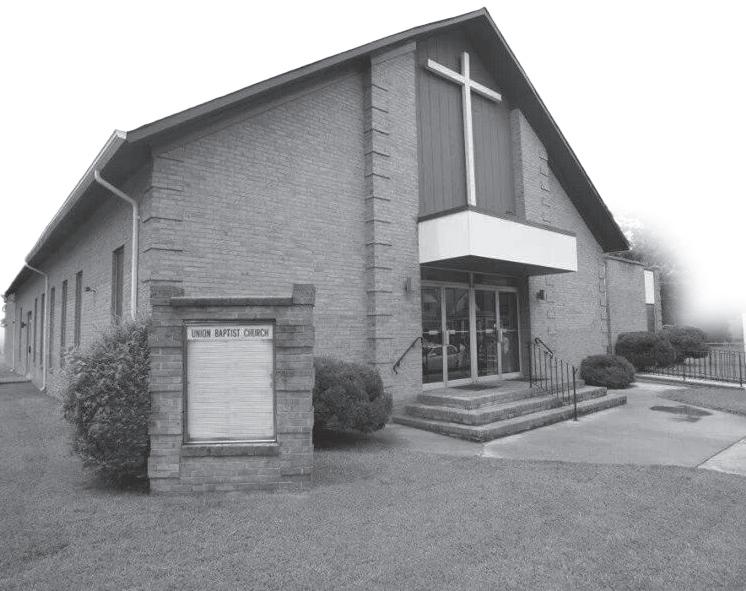


cate. The discussion will be moderated by Andrea Price of the Virginia Center on Aging and Alter Dementia.
Wisdom Watch Alliance is a volunteer-led initiative that seeks to raise awareness of dementia and elder abuse in Richmond’s Black community and to increase access to early dementia screenings. Registration is encouraged for this free event at wisdomwatchalliance.
org.
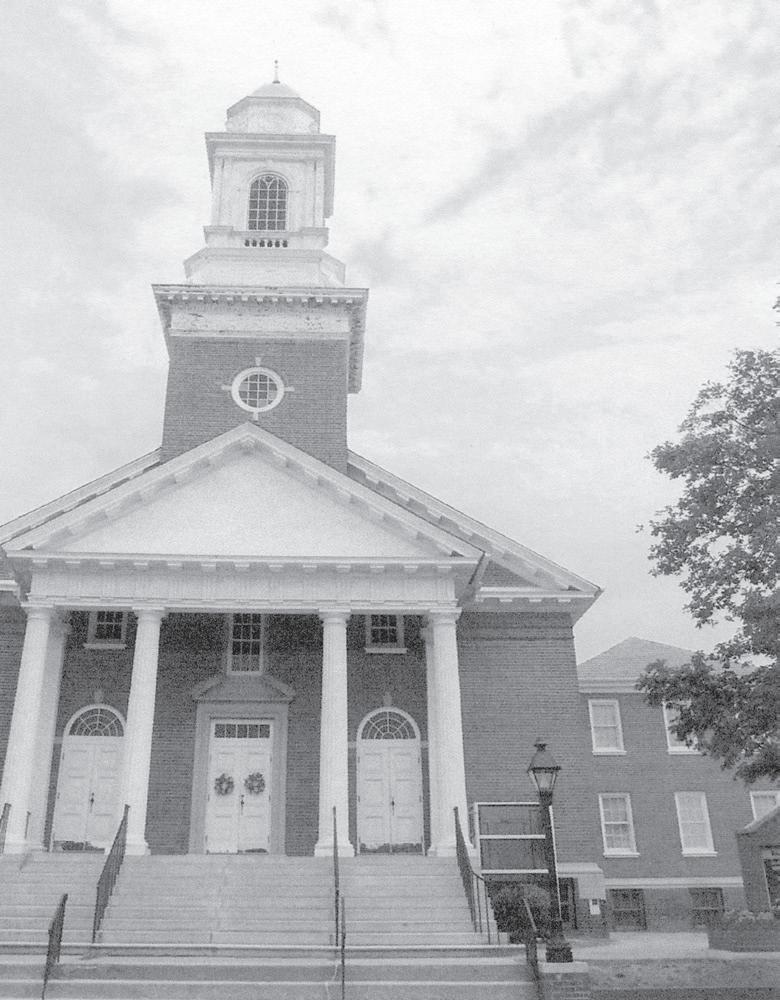
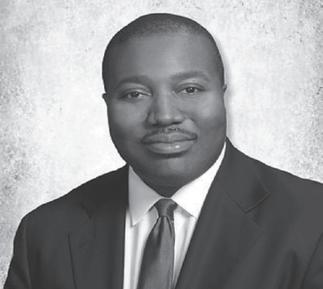





career path after shadowing him during a college winter break.
“I saw his relationships with his patients, the transformations he was doing not only cosmetically, physically, but internally as well,” she said. She began working at Jones’ practice months after graduating in 1999. “I didn’t give it a second thought.”
Alongside his practice, Jones was a longtime member of the Old Dominion Dental Society, the National Association of Guardsmen and the Peter B. Ramsey Dental Society, and he was an avid car collector.
He was also a devoted patriarch, hosting an outdoor Christmas celebration during the early years of the pandemic, encouraging children’s educational and athletic interests and spending time with family the Sunday before his death.
Jones is preceded in death by his parents, wife and brothers Karl and Hiawatha. He is survived by his brother Warner Jones Jr., four sons, two daughters-in-law, six grandchildren and other family and friends.
A funeral will be held Thursday, Oct. 9, at 11 a.m. at Garland Avenue Baptist Church, 2700 Garland Ave.




